#i also should have changed it to たまご instead
Explore tagged Tumblr posts
Text
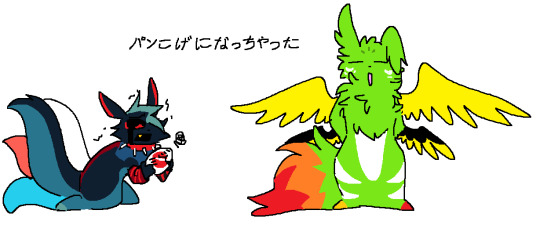
enot's egg was burnt into crisp
#nyaworld au#fishdoesdoodles#just a simple quick nyaworld au doodle because why not#been a while since ive properly draw this au again LMAO#im actually glad that alot of you guys are invested in this silly au#and i really really appreciate that#i also should have changed it to たまご instead#rw au#rw enot#rw inv#rw sofanthiel#rw saint#rainworld au#rw slugcat
71 notes
·
View notes
Text
"The one who reduced me to what I am now is you"
So @impish-ivy asked me to look at the English and Japanese versions of Solomon's and Nightbringer's conversation in 10-A, and there are two things in particular that I'd like to highlight a little (if you want to compare the two versions yourself, I've included the Japanese version, my translation of it and the English version of their entire conversation below the cut)
The first one is about this:
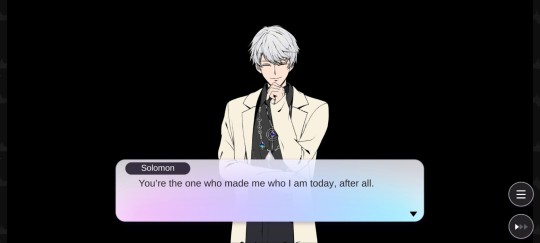
The Japanese version actually more closely translates to "The one who reduced me to what I am now is you" (aka the title). It's a small difference, but it adds a lot more malice to Solomon's words + it also slightly reframes that agreement of theirs that Solomon was talking about to imo
I still wish NB would focus more on its namesake so we could figure out what the relationship between Sol and NB is and what exactly happened between them but oh well.. We still have 6 lessons to go for this season, so maybe we'll get lucky and they at least drop a few hints for us
Anyway as for the second one:
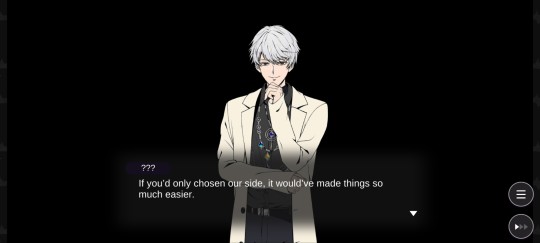
"If you had chosen this, it would have been easy". The "this" is what I want to focus on real quick
Given that right before their conversation, Solomon was asked to choose between demons and angels (tho he ultimalety ended up chosing humanity), so it would make sense to assume that that's what Nightbringer is referring to. But since the meaning of "this" was never specified, it could also mean that the actual purpose of the test might have been to see if Solomon would be willing to abandon humanity instead
Considering that Solomon has now repeadetely asked MC to side with humanity, and how there's also been some emphasize on how demons and angels do not see humans as equals, it's definitely possible, at least
Anyway, translations below the cut for anyone that wants to read through them!
This is how I've structured it:
[speaker]
日本語バージョン (Japanese version) [my translation (I tried to stick as close to the original meaning as possible)] English version
⸺
???
......困った人だ [...you're a difficult person] ...You always have to be difficult.
???
いや、面倒な人だ、あなたは [No, a troublesome person is what you are] Or perhaps difficult isn't the right word. Troublesome is what you are.
???
もしくは、その両方ですね [Or both] Actually, I suppose both are true.
???
こちらを選んでしまえば、楽なのに [If you had chosen this, it would have been easy] If you'd only chosen our side, it would've made things so much easier.
Solomon
あはは。ご期待に添えなくて悪いね [Ahaha. I'm sorry for not meeting your expectations] Ahaha. Sorry to disappoint you!
Solomon
俺がそうしないことは、君も知ってるだろう? [You knew I wouldn't do that, no?] But you must know I wouldn't do that, right?
Solomon
どうして今さら俺を試すようなことをするんだ? [Why are you testing me now?] So why are you testing me? Shouldn't we be past that point?
Solomon
俺の信念が揺らいでるようにでも見えた? [Did it seem like my believes were wavering?] Did you think I might be questioning my convictions?
???
揺らいでいる、とは思っていません [I don't think it's wavering] Not at the moment, no.
???
ですがー [But...] However...
???
あの方......。 可愛い弟子のあの方が巻き込まれても [That person... Even if that cute apprentice should get involved...] What if your adorable apprentice were to get caught up in all of this?
???
あなたが揺らぐことはないのでしょうか [...would you never waver?] Perhaps then you might reconsider your convictions?
Solomon
それは脅しかい? 悪魔みたいなことを言うんだな [Is that a threat? You sound like a demon...] Is that a threat? You know, you sound just like a demon...
Solomon
でも大丈夫。MCも俺と同じ気持ちだからね [But it's alright. MC feels the same way as me, after all] Still, it doesn't change anything. Because MC feels the same way I do.
???
あの方の本当に望むことを、自分なら 理解していると?過信しすぎでは? [Do you think you can understand what that person really wants? Are you overconfident?] You think you know what it is your apprentice truly wants? That you can see inside the heart of another? That doesn't strike you as overconfident?
Solomon
そうでもないよ [Not really] Not at all.
???
その傲慢なほどの自信は いったいどこから満ちてくるのか...... [Where on earth is that arrogant self-confidence coming from...] You have confidence to the point of arrogance. Where exactly does it come from, I wonder...
???
あなたこそ、悪魔のような振る舞いを しているのでは? [Aren't you the one acting like a demon?] Have you considered that you're behaving quite a bit like a demon yourself?
Solomon
悪魔のような振る舞いかあ。 でも考えてみたら、仕方ないことじゃないか? [I'm acting like a demon? But if you try thinking about it, isn't it inevitable?] You think I'm behaving like a demon... Well, if you think about it, that's to be expected, right?
Solomon
だってさ [Because] I mean...
Solomon
今の俺を減らしたのは、君なんだから [The one who reduced me to what I am now is you] You're the one who made me who I am today, after all.
Solomon
そうだろう? 「ナイトブリンガー」 [Right? "Nightbringer"] Isn't that right, Nightbringer...?
#will any of this ever be relevant to the story? who knows! i hope it will tho#i hope we kinda speed through lucifer's arc so that we can return to figuring out who nightbringer is and what he wants#obey me#obey me nightbringer#obey me solomon#mel translates#obey me analysis
191 notes
·
View notes
Text

𝜗𝜚 。˚₊. ⠀⠀ MIZUKI ⠀ ( 🦢 ) what’s in my bag ! ───── interview with vogue japan 𖤛

⠀⠀ こんにちは、ヴォーグ!こちらはSEVENTEENのミズキです、そしてこれが私のプラダのバッグの中です。こちらはCELESTE/BLACKカラーのTERRY TOTE BAGです。
[ENG] Hello Vogue! This is Mizuki from SEVENTEEN and this is inside my Prada bag. This is a Terry Tote Bag in the color Celeste/Black.

⠀⠀ 財布の代わりにこのトートバッグを手に入れたのは、私が自分に必要なものはすべて持ち歩くという信念があるからです。言うまでもなく、私のメンバーは 13 人いますが、その中で私が最も機知に富んだメンバーです。青という色もとても気に入っていて、とても落ち着く色です。
[ENG] I got this tote bag instead of a purse because of my belief that I carry everything I need with me. Needless to say, I have 13 members, but I am the most witty member. I also really like the color blue, it's a very calming color.

⠀⠀ iPhone XSから始めるのが良いと思います。それは間違いなく誰にとっても、特に私にとっては毎日の必需品です。人々は私に iPhone を変えるように言いましたが、私はそれが問題だとは思いません。より良い美学。でも、近いうちに携帯電話を変えようと考えています。私の携帯電話が故障したり、メンバーの携帯電話が故障したりした場合に備えて、彼は充電器を 2 つ持ち歩いています。
[ENG] I think I should start with the iPhone XS. It is definitely a daily essential for everyone, especially for me. People have told me to change my iPhone, but I don't see a problem with that. Better aesthetics. But I'm thinking of changing my phone in the near future. I carry two chargers in case my phone breaks down or the member's phone breaks down.

⠀⠀ 3つ目はヘッドフォンです。多くのメンバーがいるグループに所属するということは、騒々しいグループに所属することも意味します。私は内向的なので、騒がしい環境よりも静かな環境を好みます。
[ENG] The third is headphones. Being in a group with many members also means being in a noisy group. I'm an introvert, so I prefer quiet environments to loud ones.

⠀⠀ 次は財布です。最近は携帯電話で支払いをしていますが、財布は常に持ち歩いていると便利です。家族、メンバー、そして私自身の写真が何枚かあります。それはPRADA SAFFIANOのピンクのカードホルダーで、私にとってはとてもうまくいきました。
[ENG] Next is the wallet. I pay with my cell phone these days, but it's convenient to always carry my wallet with me. I have some photos of my family, members and myself. It's a Prada Saffiano pink card holder and it worked great for me.

⠀⠀ ああ、これはちょっと面白いですね。 1つは使い物にならないので、メガネを3つ持っています。それは私にとって間違いなく最良の買い物ではありませんでしたが、それは多くの点で私の見た目を良くしてくれました。どれが一番いいと思いますか?それは黒ですか、それとも金ですか?黒いものは...大丈夫です。お願いします!何てことだ..
[ENG] Oh this is kind of funny. I have 3 glasses because one is not enough. It's definitely not the best buy for me, but it made me look better in many ways. Which one do you think is the best? Is it the black one or is it the gold one? The black one it is...! Oh my god..

⠀⠀ 最後はヘアゴムです。残念ながら私は他のメンバーのように髪が短くないので、ヘアゴムを持ち歩かなければなりません。紫色のプラダのヘアゴムで、ご覧のとおり、私のバッグはすべてプラダです。ファンは私をプラダガールと呼んでいますが、私はその名前に恥じないで生きてきました。
[ENG] The last is a hair tie. Unfortunately, my hair isn't as short as the other members, so I have to carry around a hair tie. A purple Prada hair tie and, as you can see, my bag is all Prada. Fans call me a Prada girl, but I've lived up to that name.

⠀⠀ そうですね、プラダのバッグをみんなに見てもらうのはとても楽しい時間でした。 SEVENTEENの美月です。以上、『VOGUE JAPAN』のWhat’s In My Bagでした!さよなら!
[ENG] Well, I had a great time showing everyone the Prada bags. This is Mizuki from SEVENTEEN. That's all for What's In My Bag from "VOGUE JAPAN"! Good Bye!

i used google translate for the japanese… i felt like adding the japanese would be a nice touch.. heh 🤓☝️
#svtminji#kpop#kpop oc#seventeen 14th member#seventeen oc#seventeen#kpop added member#seventeen added member#seventeen female member#vogue japan#seventeen x oc#kpop female addition#kpop female oc#kpopidol#jpop#japan#seventeen female addition#seventeen female oc#kpop female member#fictional kpop oc#fake kpop idol#kpop original character#fictional kpop idol#kpop x oc#fictional idol community
45 notes
·
View notes
Text
月曜日 2023/9/25
月曜日 2023/9/25
こんにちは!! みんなは元気?私はまあまあ。
I know I said I would post over the summer but I didn't. ごめん!
この夏は忙しいですが、ちょっとつまらなかった。たくさん働きたり、運転したり、ビデオゲームをした。たくさん原神インパクトをした。原神が一番好きです。
あのう、あまり日本語は勉強しなかった。韓国語と中国語も。仕事の後、疲れていた。ごめんなさい。今学期、がんばりましょう!
あのう、昨日の夜、ご飯を作ったのですが、どろどろでした。おいしくなかった。
I know we're a bit in the semester already but I missed the first two weeks because of some family stuff and I was playing catch up when I got back. i've just been so busy with work, school, clubs, etc. and then i was going through relationship drama, and was pretty depressed due to that and overworking myself BUT I will try my best to summarize what we've learned so far. 自分が大丈夫だ。(と思います。)
The major grammar points we've learned so far are
たい/たがっています
たりする
ほうがいいです
んです
すぎる
~ので
お/ご+verb stem+します
can't forget to mention the crap ton of kanji and vocab we have to learn on the daily 😀
you know the drill.... lets go over the grammar!!
So たいです/たくないですadds on to the verb stem and it means want/desire for something
I want to eat = (私は)食べたい(です)。(were gonna keep things casual)
i want to drink alcohol = お酒を飲みたい。
I want to skip class = 授業(じゅぎょう)をサボりたい。
I want to climb Mt. Fuji = 富士山(ふじさん)に登(のぼ)りたい。
I want to make a cake = ケーキを作りたい。
I dont want to learn Japanese = 日本語を習いたくない。
(for negative sentences, instead of い you put the くない。)it's the same for いadjectives so im not gonna cover it much. I think you guys can figure it out. (I believe in you!)
Pretty simple. ます form but put たい instead. EZ PEEZEE
Similarly is たがっている。 that's used when you talk about what someone else wants. If I remember correctly, my teacher told us that expressing your wants is childish in Japanese culture? I think it was something like that but i'll have to fact check that.
So, Tanaka wants to work at the library. = 田中さんは図書館で働きたがっている。
You set it up as if your about to say たい but instead of い, you say がっている。もっと練習しましょう。
母は写真を撮りたがっている。It seems my mom would like to take a picture. Both the tanaka example and mom example are correct. They pretty much mean the same thing.
Uno mas
山下先生は風邪(かぜ)をひきたがっていない。Prof. Yamashita doesnt want to catch a cold. (i looked online and through every paper I had and none specified if I used いません or some other way so were gonna go with this for now.
Again, easy peasy. Moving on.
次
たりする is used to list events. Its similar to ~て、but て is more like exact events. たり is used to describe things you did without explaining everything, if that makes sense
パリとダブリンに行ったり、買い物をしたりした。= I did things like go to Paris and Dublin and go shopping.
ケーキを作ったり、 本を読んだりした。
たり is in past て form!!
たり implies you did more than JUST going there and shopping. 分かる?instead of たい,you change the い to り and then when you finished the sentence, you can do たりする、たりした、たりします、たりしました、たりするのは/が。。。です~~~ and so forth.
次
ほうがいいです is should/should not do. Its also called “its better to do…”
You should do something: past+ほうがいいです(ね/よ)
You should not do something: present negative+ほうがいいです(ね/よ)
Por ejemplo,
You should not exercise - うんどうしないほうがいいです。
You should sing - 歌ったほうがいいです。
You should no go out tonight - 今夜出かけないほうがいいです。
You should take medicine - くすりを飲んだほうがいいです。
Its kinda confusing cause theres also どっちのほうがいいですか。which we learned last semester but i guess mean the same thing. “Its better if you do xyz”,,,, “which is better?”
We can then pair this up with んです
Lowkey, im an んです hater. Its purpose it to “add emotion”
For present verbs you do dictionary form + んです ー 食べる>食べるんです。
For past verbs you do short て form + んです ー 食べた>食べたんです。
For positive い adjectives, you simply add the んです after the い。 ー かわいい>かわいいんです
For negative present い adjectives, you negate it normally and then have the んです the ない ー かわいくない>かわいくないんです
For negative past い adjectives you negate it normallly かわいくなかった and simply add the the んです>かわいくなかったんです。
For な adjectives, you add なんです。元気なんです、好きなんです、にぎやかなんです。
For past な adectives, its just 元気だったんです、すきだったんです、にぎやかだったんです。
The short form of でした.
I feel like its pretty self explanatory.
Lets combine んです and ほうがいいです
A: ああ、あたまがいたいんです…
B:じゃあ、水を飲んだほうがいいです。
See?! Super easy!
I’m kinda running out of time so I’ll leave it at that for now. I also don't want this to get too long. Next post will have すぎる、~ので、and お/ご and then after that I’ll finally tell you all about my summer and things happening in my life lately!! I'm so happy to finally be posting again. I've missed you, reader-chan. I finally have someone to talk to TT
じゃあ、また明日!!!<3
今日の歌はKumi Koda - Guess Who Is Backです。(I remember listening to this song when I was a freshman in highschool. maybe it was middle school...ah, the memories..)
Notice any errors? Lmk!! I always want to fix my mistakes so I can learn better. ありがとう!
19 notes
·
View notes
Text
文法:〜させる(使役形・Causative Tense)
The causative tense mainly describes two types of situations:
1) When someone makes someone else do something. This can be through instructions (like from a parent to child, or teacher to student), persuasion, or even force.
母は私にケーキを食べさせました。 My mother made me eat cake (even though I didn’t want to).
2) When someone lets someone else do something, either by giving them permission or by remaining hands-off and not interfering.
母は私にケーキを食べさせました。 My mother let me eat cake (for my birthday! Isn’t she the world’s best mom?).
For the most part you have to rely on context or common sense to help you distinguish between the two.
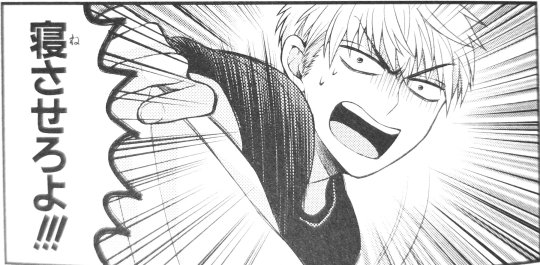
寝させろよ!!! LET ME SLEEP!!!
(『月刊少女野崎くん』 Girl’s Monthly Nozaki-kun, vol. 4 by Izumi Tsubaki)
You can think of the sentence form as a stereotypical child/parent relationship, where the "parent" allows or makes the "child" do certain actions. Of course both could be omitted from the sentence, but even so it’s best to keep this structure in mind:
"Parent" は・が "Child" に・を (Causative verb) "Parent" makes/lets "Child" do ~
The "Child" most commonly takes に, but it may take を instead if 1) the child unconsciously or unwillingly performs the action; 2) the child is actually a thing with no will of its own; or 3) if you are using another に particle somewhere in the sentence. Similarly if the verb is transitive and を is being used for another object, you should use に. (*)
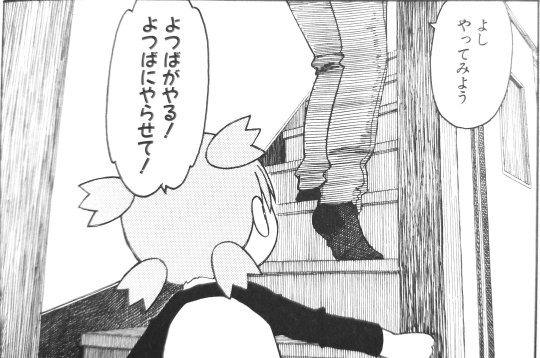
- よし やってみよう - よつばがやる!よつばにやらせて! - All right, let's give it a try. - Yotsuba will try! Let Yotsuba try!
(『よつばと!』 Yotsuba&!, vol. 8?? by Azuma Kiyohoko)
Causative Tense Conjugation (Standard)
る verbs: Replace the る with させる
食べる → 食べさせる
う verbs: Replace the -u sound with -aせる
買う → 買わせる 読む → 読ませる 行く → 行かせる 急ぐ → 急がせる 立つ → 立たせる 死ぬ → 死なせる 帰る → 帰らせる 遊ぶ → 遊ばせる 話す → 話させる
Irregular verbs:
する → させる 来る → こさせる
Once in the causative tense, these verbs all conjugate as regular る verbs.
Slang Variations
There are several variations on the standard conjugation patterns.
1) Shortened Conjugation
る verbs: Replace the る with さす
食べる → 食べさす
う verbs: Replace the -u sound with -aす
買う → 買わす 読む → 読ます …
Irregular verbs:
する → さす 来る → こさす
This form is much rarer than the original form, and may be seen in dialects like Kansai-ben. It is slang, but there are some words that have made it into standard Japanese: 泳がす (to make ~ swim), 沸かす (to boil ~), and 寝かす (to put ~ to sleep). (*)
2) さ入れ言葉
Unlike shortened conjugation, this conjugation is actually nonstandard and would be marked incorrect. But much like ら抜き is growing more common with potential verbs, many young people especially may incorrectly* add an extra さ into their conjugation of う verbs like so:
買う → 買わさせる 読む → 読まさせる
While it may not be in your best interest as a language learner to use さ入れ言葉, you may hear or see it used so it’s best to be aware of its existence. (*)
(*according to textbooks, but language is a constantly evolving creature so who are we to judge!)
Causative て + Give/Receive Verbs
Combining the Causative tense in the て form with give/receive verbs is one easy clue that the causative is being used with the meaning of “Let” rather than “Make.” The speaker's role in the sentence is usually set as either the subject or the receiver by the very nature of give/receive verbs, so you’re not going to find too many counterexamples. (*) Here’s a breakdown of some combinations:
・ Causer が(私 - Doer に)〜させてくれる (⇑Honorific: 〜させてくださる) You are being allowed to do something, and this carries the sense that you’re grateful. A negative question would be used to ask permission. 〜させてくれない? 〜させてくれませんか?(Can’t I ...?) 〜させてください。(Please let me …)
・(私 - Causer が)Doer に 〜させてあげる (⇓Casual: 〜させてやる) You allow someone to do something. やる makes the expression rougher, and is used mostly by men. 〜させてあげようか?(Just this once, I'll let you ...) 〜ないと...させてあげないよ (If you don't ~, I won't let you ...)
・(私 - Doer が)Causer に 〜させてもらう (⇑Honorific: 〜させていただく) Very similar to させてくれる, and describes an action you are allowed to do. However, note that the particles will be reversed since it is changed to “receiving!” It can also be used to ask for permission. 〜させてもらえない?(May I …?) 〜させていただけませんか?(May I …?) 〜させていただきます。(Allow me to…) 〜させていただいてありがとうございました。 (Thank you for allowing me to … )
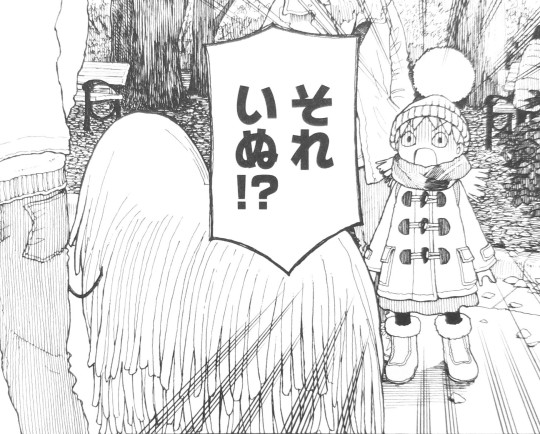

- それいぬ!? - なでさせてもらうか? - …いい - That's a DOG?! - Shall we ask to pet it? - ...No, that's ok.
(『よつばと!』 Yotsuba&!, vol. 14 by Azuma Kiyohoko)

善逸さんは今日から訓練参加ですので ご説明させていただきますね(キリッ) Because Zenitsu is joining our training starting today, allow me to explain. (Resolute)
(『鬼滅の刃』 Demon Slayer vol. 6 by Gotoge Koyoharu)
Because of the particle switch, させてもらう・いただく actually translates more naturally into the passive tense in English, since the focus of the sentence has been reversed to focus on the one who is being made to do something. While we can get around that dissonance by translating it as a request like "Please allow me to...", sometimes it can't really be helped. In the following example, in Nozaki's conversation with his new editor, the editor explains that he's already familiar with his work, so requesting permission would be unnatural--he's already read it. While Nozaki, who is wary of a new editor and startled by the news hasn't explicitly granted him that permission, the editor uses the causative voice with 頂く to emphasize his gratefulness:
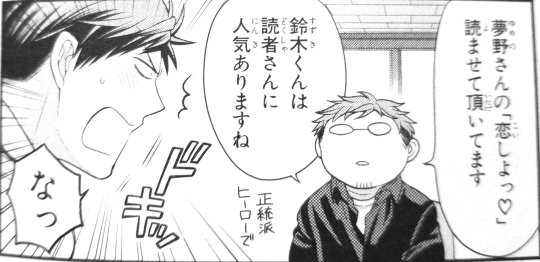
- 夢野さんの「恋しよっ♡」読ませて頂いてます 鈴木くんは読者さんに人気ありますね(正統派ヒーローで) -(ドキッ)なっ - Mr. Yumeno, I was given the opportunity to read your manga, Let's Fall in Love ♡. Suzuki certainly is popular among readers (As a standard hero) - (Ba-bump) Wha--
(『月刊少女野崎くん』 Girl’s Monthly Nozaki-kun, vol. 4 by Izumi Tsubaki)
Causative + てしまう
While allowing and forcing are the two main uses of the causative form, there is one other usage: the responsibility usage, often indicated by its combination with the てしまう (to regretfully allow something to happen) grammar. This version expresses the guilt of the subject (who is usually the speaker, but not always) in not being able to stop a sequence of events from happening.(*) They let this happen, and it's all their fault.

おれが気づかなかったせいで59人も死なせてしまった I let so many people die--fifty-nine people--all because I didn't notice.
(『不滅のあなたへ』 To Your Eternity, vol. 11, by Oima Yoshitoki)
J-Rock Examples:
完成させないでもっと良くして Without finishing it, make it better [宇多田ヒカル - 光]
このままじゃ終わらせないの I won’t let it end like this! [DOLL$BOXX – Take My Chance]
散った願いも/いつの日にか花を咲かせるだろう Even scattered wishes / will probably make the flowers bloom someday. [スキマスイッチ - 桜夜風]
アスファルトから出た芽が僕に知らせた。恋をしていた The plants sprouting from the asphalt told me [made me aware] so. I was in love. [HY - モノクロ]
震えるほどに 心躍らせたいの 始めようよ [I] Want to make my heart pound so I shake Let’s begin [Perfume - Spring of Life]
あなたを夢中にさせて I’ll put you in a trance [exist†trace - GINGER]
一人にさせない Don’t leave me alone (Lit: Do not make me into one person.) [宇多田ヒカル - Prisoner of Love]
言葉なんか忘れさせて Make me forget those words
目を閉じたまま踊らせて Make me dance with my eyes still closed
[宇多田ヒカル - 忘却 featuring KOHH]
言葉にできない想いを/今宵は歌にして聴かせたい Tonight, I want to let you hear the song / Made of the thoughts I can’t put into words (Careful with this one–since there is no が・に to indicate whether the speaker or listener is allowed to hear, pay attention to the たい which clarifies it’s the speaker’s desire to permit. “I want you to let me” would be させてほしい or させて+くれたい・もらいたい, etc.) [宇多田ヒカル - 荒野の狼]
いつでも皆を笑わせる Always making everyone laugh [水曜日のカンパネラ - 一休さん]
舞い上がる 愛を踊らせて It lets love dance Soaring high [X JAPAN - ENDLESS RAIN]
194 notes
·
View notes
Text
Kirby Planet Robobot Translation Comparison: Meta Knightmare Returns

This will be a comparison of the original Japanese version and the US English localized version.
Specifically, this will cover all the cutscenes that appear in the Meta Knightmare Returns mode.
You can also watch these cutscenes for yourself in English (1, 2, 3) and Japanese (1, 2, 3).
For the comparison, the usual points apply:
Bolded is the original Japanese text, for the reference.
Bolded and italicized is my translation.
Italicized is the official NOA translation.
A (number) indicates that I have a specific comment to make on that part in the translation notes.
As you read this, please keep in mind that with translations like these, it’s important not to focus on the exact literal wordings, since there is no single “correct answer” when it comes to translations.
Rather than that, consider the actual information that is being conveyed, in which way, and why.
--
Encountering Star Dream:
Star Dream:
……R…E…A…… ……D…Y……………・>
...R...E...A... ...D...Y... ->
L...O...A...D...I...N...G...
Star Dream:
……………………。
...
.........
Star Dream:
アナタが…新しい… ゴシュジン様…デスネ。
YOU must BE... the new... MASter.
You must be... the new admin.
Star Dream:
……ナルホド、とても ツヨイパワーを お持ち のヨウデ…。
...UNDERSTOOD, it APPEARS that you possess quite TREMENDOUS POWER...
Yes. You possess incredible power...
Star Dream:
……………… OK>
...OK >
...OK.
Star Dream:
…デハ、ソンナ ゴシュジン様ガ ノゾム…
...THEN, AS SUCH A MASter WOULD DESIRE...
As a new admin, you must supply your credentials...
Star Dream:
コノ星でも… カナリの ��サを持つ…
YOU SHALL be given... THE OPPORTUNITY TO CLASH with a "sword USER"...
to the strongest warriors of this planet.
Star Dream:
「剣のツカイテ」と、 タタカワセテ…さしあげ マショウ。
WHO possesses CONSIDERABLE strenGTH... even for THIS planet.
Executing Sword_Master.EXE.
-
Before Battling Sectonia Clone:
Star Dream:
……おみごと デ、ゴザイマス。
...MasterFULLY DONE.
...Impressive.
Star Dream:
ゴシュジン様には ショウショウ モノたり ナカッタ かも しれマセンネ。
Perhaps THIS was A LITTLE UNsatisfactory for you, MASter.
That may have been a bit too easy for the admin...
Star Dream:
ソレでは 次に、 美シク まうようニ 剣を アヤツる…
SO then, for THE next one, the most powerful queen...
Next up is one whose swordplay resembles a beautiful dance...
Star Dream:
最強の女王を、 ヨミガエ らせ マショウ。
WHO HANDles her blades liKE A beautiFUL dance, shall BE RESURRECTED.
Let us bring back the most powerful queen from the void.
Star Dream:
ソノ たぐいまれな 戦いのセンスと 王たる オーラ…
HER exceptional APTITUDE for battle, and her majestic AURA...
Experience her royal presence and unparalleled fighting skills.
Star Dream:
ドウゾ ゴたんのう クダサイませ。
PLEASE, ENjoy them thoroUGHLY.
She will be a fitting test for you.
-
Before Battling Galacta Knight:
Star Dream:
サスガ、ゴシュジン様デス。 では サイゴに…
WELL DONE AS ALWAYS, MASter. Now, FOR THE LAST one...
You are mighty indeed. Now for the final test...
Star Dream:
かつての ゴシュジン様にハ キンジられて イタ…
THE "Spacetime Transfer Programm", WHICH the previous MASter had FORBIDDEN...
This was prohibited by the previous admin...
Star Dream:
「時空テンイ プログラム」を アンロック シ、
SHALL BE UNLOCKED,
Preparing to boot the Space-Time Transport program...
Star Dream:
イニシエの時代ノ 剣士ヲ、 ヨビダシ マショウ。
TO CALL FORTH A swordfighter from ANCIENT TIMES.
Let us bring back a legendary swordsman from a forgotten time.
Star Dream:
…カレに コノあたりノ 星ハ ホロボされて シマウと 思イマスガ…
...IT STANDS TO reason that HE is LIKELY TO DESTroy the SURrounding planets, BUT...
He may end up destroying a nearby planet or two, but such is life.
Star Dream:
キット、 サイゴノタタカイを 楽シンデ イタダケル ことデショウ。
You will MOST CERTAINLY find THIS LAST BATTLE to be enjoyABLE.
The benefits of this final battle outweigh the collateral damage.
Star Dream:
ソレでは………!
NOW then...!
Prepare yourself...
Star Dream:
時空テンイ プログラム… アンロック… 異空間ロード… リブート…
UNLOCKING... Space Time Transfer Program... REBOOTING... Another Dimension Road... (1)
Executing Space-Time Transport... Extra-dimensional road... Booting...
Star Dream:
…………3
3...
3...
Star Dream:
…………2
2...
2...
Star Dream:
…………1
1...
1...
Star Dream:
…………………GO!!
...GO!!
...BEGIN!
Translation Note:
I’ll go over it in more detail in the section below, but the term I translated as “Another Dimension Road” is called 異空間ロード/Ikūkan Rōdo in Japanese. This term previously appeared in the Japanese version of Kirby’s Return to Dream Land.
--
Comparisons & Thoughts:
Since the cutscenes of Meta Knightmare Returns all occur towards the end and are pretty short, I decided to cover all of them in one post like this.
Still, just because they’re short doesn’t mean there is nothing to talk about.
-
It’s only mentioned briefly in these cutscenes, but I want to go over the term I adapted as “Another Dimension Road” in slightly more detail.
In the original Japanese version, the term is 異空間ロード/Ikūkan Rōdo, which first appeared in the Japanese version of Kirby’s Return to Dream Land.
To start off, 異空間/Ikūkan by itself could be translated as something like “different dimension", “different space”, “different realm”, or anything along those lines, 異/i meaning “different”, and 空間/kūkan meaning “space” or “dimension”, and the like.
This term has come up a few times in the Kirby series since Return to Dream Land, and the Japanese version of Star Allies actually gives it the English reading “Another Dimension”, which is why I also like to adapt it as that.
The term 異空間ロード/Ikūkan Rōdo, adding the English word “road” to it, also comes up a few times in Return to Dream Land.
Given what I explained above, I like to adapt it as “Another Dimension Road”.
Magolor mentions this term when he talks about his home, saying that it’s far away, but that it’s connected to Pop Star via 異空間ロード/Ikūkan Rōdo.
The English localization of the game adapted this as “interdimensional tunnel” in this instance.
Also, the cutscene that is called “Final Battle” in the English version is simply called 異空間ロード/Ikūkan Rōdo in Japanese.
Going by that, it seems safe to assume that this term can refer to the “road(s)” that connects different dimensions, realms, or the like.
Now, there is a lot more I could potentially talk about with these two terms and how they come up in the Kirby series, but it would be too long for this section here.
I might make a dedicated post just for that at some point, if that would interest people.
So, most relevant to Planet Robobot, is the fact that “Another Dimension Road” is a term we had seen before in Return to Dream Land.
The English version might be trying to keep the connection to Return to Dream Land by adapting the term as “Extra-dimensional road“ here, possibly referring to the Extra Mode of that game.
-
Back to Planet Robobot, here’s something potentially interesting about Star Dream in these cutscenes.
You’ll find that in both Japanese and English it uses about the same speaking style as it did during its appearance in the main story.
And the English version actually adapts it in the same way as it did back then, so I appreciate the consistency there.
Like before, the English version has it use some more computer-like sounding phrases here, like saying “admin” instead of “master”.
Most notable as a change is probably the phrase “Sword_Master.EXE”, which would imply that Star Dream might have a dedicated program just for either cloning Dark Matter Blade, or sword users in general.
But what’s really interesting to me is something else.
Now, I don’t know if this is just a coincidence, but Star Dream does not refer to itself in first person at any point in these cutscenes
With the way the Japanese language works, this isn’t all too uncommon, but it still stands out a bit, because Star Dream referring to itself in first person during the main story was a notable trait it had.
A machine wouldn’t normally refer to itself like that, so Star Dream doing that seemed like a result of it gaining a sense of self during those events.
And keep in mind that those events, namely Star Dream fusing with Hatlmann’s spirit, don’t actually occur during the story of Meta Knightmare, meaning Star Dream actually should not have a sense of self in this scenario.
So, Star Dream not referring to itself in first person during these cutscenes could be meant to reflect that? But that’s just my guess.
In any case, because of the above, I decided to adapt its dialogue in these cutscenes without using any first person either.
And from what I can tell, it looks like the English localization may have thought the same thing, since they also don’t use any (singular) first person for Star Dream here.
I realize this means there isn’t any difference between versions when it comes to this aspect, but I still wanted to mention it, because it’s easy to miss.
-
In the Japanese version, Star Dream’s dialogue here contains more direct references to Milky Way Wishes, with it using several of the same phrases that Galactic Nova used.
Most notably, this includes it counting down from 3 and finishing the counter with the words “Go!!”, which is also referenced during its boss battles.
In the English version, these phrases are slightly rewritten and don’t match Galactic Nova’s dialogue from either English version of Milky Way Wishes, with the countdown in particular ending with “Begin!” instead.
As a result, that final line also no longer matches the visuals of Star Dream’s final boss battle.
If you only look at the text in this game right here, it does make sense to rewrite these phrases slightly, “Begin!” certainly sounds more appropriate than “Go!!” out of context.
But this, combined with the fact that any other subtle reference to Milky Way Wishes in the text so far has been glossed over in English makes me think that the English localizers either didn’t realize that these were references, or ended up ignoring them for some reason.
Whatever said reason may be, I still think it’s a shame, because when you add all of them up, there is a great deal of connections to Milky Way Wishes in this game’s text that are lost in the English version, leaving it only with the visual and musical references.
And those are still nice, don’t get me wrong, but it still feels like you’re missing out just a little.
-
Somewhat related to the above, Star Dream’s reasoning for its actions in these cutscenes is quite different between versions, changing a lot about the context of what is happening.
In the Japanese version, Star Dream seemingly comes to the conclusion that Meta Knight wishes to fight strong opponents. So, the reason why it proceeds to summon several powerful warriors is specifically because it is attempting to comply with that desire.
And that really seems to be all there is to it in the Japanese version, no apparent additional motivation other than to satisfy its new master Meta Knight.
At most you can speculate whether or not Meta Knight really was actively wishing for this to happen, or if Star Dream was misinterpreting him, but...
Considering this is a direct parallel to Meta Knightmare Ultra, and Meta Knight did wish for something exactly like that over there, I’d wager it’s safe to bet Star Dream’s assessment of him was at least partially accurate.
And of course, this also gives Star Dream another direct parallel to Galactic Nova.
In the English version, Star Dream instead states that Meta Knight has to supply his credentials, and thus all the battles that follow are portrayed as “tests” for Meta Knight.
This also implies that Star Dream would probably test any potential new admin in such a manner, in contrast to the Japanese version, where Star Dream seems to accept Meta Knight right away without question.
I know that this particular change has caused English-speaking fans to speculate what sort of test Haltmann may have had to pass, which can be interesting of course.
But for the reference, no such tests seem to exist in the Japanese version.
-
And still related to the above, in the English version, Star Dream states that Meta Knight must supply his credentials “to the strongest warriors of this planet”, which might even be a small translation error?
Because in the Japanese version, Star Dream only states that Meta Knight will have the opportunity to “CLASH with a sword USER… WHO possesses CONSIDERABLE strenGTH… even for THIS planet”, so that latter part is only referring to the clone of Dark Matter Blade.
There is no clear plural in Japanese, so one could interpret the Japanese line as referring to all three warriors that Star Dream ends up summoning, but since it gives a little introduction for Sectonia Clone and Galacta Knight, I think it’s more likely this line right here was just its introduction for Dark Matter Clone.
The English phrasing also makes you wonder why Star Dream would even summon Galacta Knight, who’s not taken from this planet, or even this era for that matter.
It just kinda doesn’t add up when you think about it more.
-
And that’s about it for these cutscenes.
The most notable change is the completely different reasoning behind Star Dream’s action here.
I personally feel it gives this entire ending scenario a different vibe, and potentially the implication of what Meta Knight’s role in it is, considering the parallels to Meta Knightmare Ultra.
With that, we have covered all of the cutscenes of Kirby: Planet Robobot, but we are not done quite yet.
There is still more story to this game, so for the next part, we will start tackling the pause screen descriptions of the boss fights!
Feel free to check it out!
--
< Previous Part | Start | Next Part >
--
#kirby#kirby of the stars#kirby planet robobot#planet robobot#kirby translations#my translations#planet robobot translation comparisons#kirby planet robobot spoilers#planet robobot spoilers#robobot spoilers
28 notes
·
View notes
Text
ロマンチックウェディング (HoneyWorks) English Translation
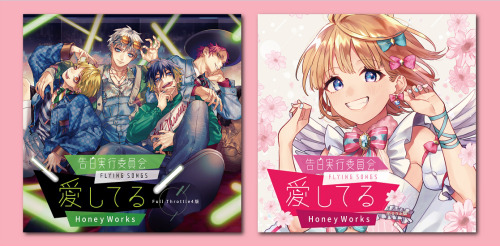
ロマンチックウェディング Romantic Wedding HoneyWorks feat. Hanon, Kotoha & かぴ キャラクター:榎本夏樹&早坂あかり&合田美桜
Lyrics: shito & Gom Composer: Uto Keiki
checked and proofread by @takanenene thank you so much!!! (.◜ω◝.)♡
-----
結婚式挙げるならドレスはねプリンセスライン 頭にフラワーリング 世界一幸せな日になるの
Kekkon shiki ageru nara doresu wa ne purinsesu rain Atama ni furawā ringu sekaiichi shiawase na hi ni naru no
If I were to wed, a *wedding ball gown is a must, A flower crown on my head, and it’ll be the happiest day in the world
お色直したくさんしたいよね 和装とかも憧れちゃう まずはプロポーズされなきゃね 逆プロポーズしちゃおうかな…
Oironaoshi takusan shitai yo ne Wasō toka mo akogarechau Mazu wa puropōzu sarenakya ne Gyaku puropōzu shichaou ka na…
I want to try out *other dresses in various colors I dream of being dressed in a kimono too But you have to propose to me first Or, should I do it instead…?
いつまでも待てないんだから ロマンチックにサプライズして 指輪とか高くなくてもいいから もらいたい自慢もしちゃいたいの 楽しみにしています 頑張れ!男の子
Itsu made mo matenain dakara Romanchikku ni sapuraizu shite Yubi wa toka takaku nakute mo ī kara Moraitai jiman mo shichaitai no Tanoshimi ni shiteimasu Ganbare! Otokonoko
I can’t wait forever, you see, So surprise me romantically There’s no need for you to give me an expensive ring But I still want you to, so I can show it off to everyone I shall anticipate it Hang in there, mister!
結婚式はみんなで写真撮ろう アルバム作ろう 子供は何人ほしい? 彼に似た男の子がほしいな
Kekkon shiki wa minna de shashin torou Arubamu tsukurou Kodomo wa nanijin hoshī? Kare ni nita otokonoko ga hoshī na
The formula for a wedding is taking pictures with everyone Let’s make an album with it How many children do I want to have? I want a boy that resembles him
新婚旅行絶対行きたいな 夢のハワイ憧れちゃう まずはプロポーズされなきゃね ダイエットして女子磨いて
Shinkon ryokō zettai ikitai na Yume no Hawaii akogarechau Mazu wa puropōzu sarenakya ne Daietto shite joshi migaite
I want to go on a honeymoon of course I dream of one in Hawaii But you have to propose to me first I’ll be on a diet and make myself more beautiful
待たせすぎると奪られちゃうよ 言い訳なんて聞きたくない ちょっとだけの時間でも嬉しいから 会いに来てキスも忘れないでね 恋する乙女なんです 頑張れ!男の子
Matase sugiru to torarechau yo Iiwake nante kikitakunai Chotto dake no jikan demo ureshī kara Ai ni kite kisu mo wasurenai de ne Koi suru otome nandesu Ganbare! Otokonoko
If you make me wait for too long, someone might take me away I don’t want to hear excuses It’s only a short time but it makes me happy Don’t forget to come see me and kiss me, okay? I am a maiden in love Hang in there, mister!
浮いたり沈んだり 面倒でごめんね 大好きだからなんだよ あなたでいっぱいだよ
Uitari shizundari Mendō de gomen ne Daisuki dakara nanda yo Anata de ippai da yo
In high-spirits and feeling blue I’m sorry for being a bother It’s because I love you I am full of you
いつまでも待てないんだから ロマンチックにサプライズして 指輪とか高くなくてもいいから もらいたい自慢もしちゃいたいの 楽しみにしています 頑張れ!男の子 憧れのプロポーズ 夢見る女の子
Itsumade mo matenain dakara Romanchikku ni sapuraizu shite Yubi wa toka takaku nakute mo ī kara Moraitai jiman mo shichaitai no Tanoshimi ni shiteimasu Ganbare! Otokonoko Akogare no puropōzu Yumemiru onna no ko
I can’t wait forever, you see, So surprise me romantically There’s no need for you to give me an expensive ring But I still want you to, so I can show it off to everyone I shall anticipate it Hang in there, mister! A proposal I’m dreaming of I’m a maiden with high hopes
—–
Notes:
*can be either princess line dress or a wedding ball gown like these
*can also mean this single kanji お色直し (changing outfits for wedding reception, etc)
—–
kanji from
T/N: English and Japanese aren’t my first language so I apologize if there are mistakes. As always, if you are going to use my translations, please credit me.
#honeyworks#aishiteru album#hanon#kotoha#utaite#enomoto natsuki#hayasaka akari#aida miou#btw the translation for juri's and koudai's#is on denzero's fb page ^^#the remaining 2 songs are to be translated by haru-san/takanenene#haniwa translation#capi
36 notes
·
View notes
Text
Banjou no Geass Gekijou
Before I post a list with all the games Rolo’s been featured in, here's more about my favorite one: the Nintendo DS board game, Banjou no Geass Gekijou. These are some of the lines you get when you land on Rolo’s squares.

へぇ、すごいですね、ライさんって。 何人もの人の声を、同時に聞き分けられるなんて…僕が必ず分かるのは兄さんの声くらいですよ… Wow, you are amazing, Rai-san. To be able to recognize the voices of multiple people simultaneously... The only one that I recognize without fail is Brother's...
すごいですね、ライさん。人を簡単に笑わせるなんて…僕にはできそうにありません。 You are amazing, Rai-san. Being able to make people laugh so easily... I don’t think I could do it.
ライさんはどうして、そんなに簡単に人を笑わせることができるんですか? あ、��え… 別にうらやましいとかそういうことではないですけど… ただ、すごいなって… Rai-san, why are you able to make people laugh so easily? Ah, no... It's not that I am jealous or anything like that... It's just, that it’s so amazing...
I think lines like this show how strong Rolo’s true self is despite being trained as an “emotionless” assassin. The sight of someone making another person happy makes him feel admiration. He had the potential to be a really good kid...
やった!僕の勝ちですね!あ、ごめんなさい… 僕ばかりが楽しんでしまったみたいで… あ、あの… また遊んでください! Yes! I won! Ah, I'm sorry... It seems I ended up being the only one who had fun... U-um... Let's play again next time, please!
And he isn’t just in touch with his own feelings, but also those of the individual he’s interacting with. I wish these pretty scenes with Rai could lead to a Good End where, having gained another person he can trust, Rolo actually started believing in his right to be loved simply by being Rolo, instead of assuming his value is tied to his usefulness as an assassin. But yeah, the Good Ends have him killing Rai, so I guess deep-rooted beliefs take long to change...
えっ!事故に遭ったんですか!…兄さんはッ!にィ~さ~んッ!! Eh! You had an accident?! ...Brother is...! Bro~ther!!
There’s a driving minigame where you play as Rivalz and Lelouch, and this is Rolo’s reaction if you crash Rivalz’s motorbike. Before playing the minigame, Rolo had asked you to please accompany Rivalz-san and Niisan because he(Rolo) doesn’t trust Rivalz-san’s driving skills. I find it amusing that Rolo actually went through the process of learning how to drive a bike and that he probably understands about vehicles (and mechas), while Lelouch likely has no interest or knowledge whatsoever. His fakememory!self was probably initially totally confused by his little sibling’s ability to drive, and it’s things like these that make the time he spent with Rolo be memories with Rolo rather than “with a Nunnally replacement”. Anyway, if you play the driving minigame when Rolo has come to like Rai as well, he will be calmer and say something like “I’m glad Niisan and you are safe”. Rivalz doesn’t even exist for Rolo.
あれ、失敗ですか。もしかしてオモチャのハンマーじゃ本気になれないですか?僕のナイフ… 貸しましょうか?フフフ… Oh, you lost? Maybe it's that you couldn't take it seriously using a toy hammer? Should I lend you... my knife? Fufufu...
This is what you get when you lose on the whac-a-character minigame. Sadly for Rolo, one of the rules in that minigame is not to hit Nunnally.
��、ライさん。ほら、見てください!兄さんからもらったんです、この回転パズル!ねえ、ライさん。一緒に組み立ててみませんか? Ah, Rai-san. Look, look at this! I received it from Brother, this rotation puzzle! Hey, Rai-san, why don't we assemble it together?
思ったより簡単にできましたね、ライさん。でも、せっかく兄さんがくれたものなんですから今度はひとりでやってみます。じゃあ… You were able to do it more easily than I thought, Rai-san. But since it's something that Brother gave me, next time I'll try to do it on my own. Well then...
Rolo allowing others to play with something given to him by Niisan? And poor Victor from the OSI had to get killed after touching his locket...
The next part needs some context first. This is from when you overhear his conversation with Villetta and Lelouch at the basement. Once he notices you there, he'll normally just kill you instantly, but if you visit them after he's already grown to like you, he hesitates and, seeing how neither Villetta nor Lelouch noticed you, offers to spare your life with the condition that you don't tell anyone what you heard. You can answer "yes" or "no". As one can guess, saying that you won't keep the secret leads to a game over.
First, "yes": じゃあ、これは… 僕らだけの秘密です… そう… 兄さんにも内緒の…
Then, this is... a secret that is only ours... That's right... a secret even to Brother...
And "no":
なるほど… 僕がバカでした… やっぱり信じられるのは… 兄さんだけ… 他のヤツなんて… …ライさん。 あなたならわかってくれると思ったのに… 残念です… I see... I was stupid... Indeed, the one that can be trusted... is only Brother... Of course there would be no one else... ...Rai-san. I thought that you would understand, and yet... It's a shame...
It might be because it’s a game and he’s merely letting the player know what’s going to happen, but still, I like that Rolo doesn’t kill Rai right away and instead expresses his emotions to him/her first. Like Rolo barely talks to people he doesn’t feel a connection with, but once he does feel it, the love he has for that person is really important to him. Enough that he’d die mainly to honor those feelings that made him feel human. Lastly, there’s a conversation between Rolo and Lelouch that you get right before Rolo’s route is completed. (Lulu)やあ、ライ。 Hi there, Rai. (Rolo)あ、ライさん。 Ah, Rai-san. ほらな、ロロ。やっぱりライはここに来ただろ? See, Rolo, Rai did come here after all, didn’t (s)he? う、うん… Y-yeah... 今、ロロと賭けをしてたんだ。ライが15分以内にここに来るかどうかをね。 結果は、俺の勝ち。 ロロ、今日の洗濯当番は代わってもらうぞ。 I just made a bet with Rolo on whether you'd arrive here within 15 minutes. The result is I won. Rolo, today you do the laundry instead. う、うん… あ、で、でも!夕食当番は兄さんだからね! Y-yes... Ah, b-but! Don’t forget that Brother is in charge of dinner! む、そうだったか… じゃあ、こうしよう。俺が今からライと何かのミニゲームで対戦する。俺が勝ったら、ロロ。オマエが夕食当番だ。 Hm, was it so?... Well then, let's do this. I'm going to compete with Rai in some minigame now. If I win, Rolo, you take care of dinner. え、また賭け事? Eh, betting again? そうさ、わかりやすいだろ?ライ、何て対戦する?オセロか?パズルか?何でもいいぞ。 That's right, isn't it simple? Rai, what will we compete in? Othello? Puzzle? Anything will do. 兄さん、水泳はどう? Brother, what about swimming? なに!?なぜ体力勝負を…! What!? Why a trial of strength...! 何でもいいって言ったじゃない? Didn't you say that anything would do? クッ!いいだろう!速く泳ぐ理論はわかっている!負けるわけがない!ライ!水泳で勝負だ!ロロ!オマエは夕食の献立でも考えておくんだな! Tch! Fine! I know the theory for swimming fast! There's no way I'll lose! Rai! It's a swimming match! Rolo! Start thinking about what to cook for dinner! It’s adorable how Rolo is so comfortable with Lelouch that he isn’t afraid to show him that he wants him to lose. Lelouch is hilariously slow at the swimming minigame despite “knowing the theory” (lol), so usually you’ll win without trying: やった!これで兄さんの手料理が食べられるよ! ありがとう、ライさん! Yes! Now I can eat Brother's home cooking! Thank you, Rai-san!
チッ… しかたないな… 晩御飯はビーフストロガノフだ!いいな! Tch... There's no helping it... Dinner will be beef stroganoff, okay?!
うん! Yes!
I’m laughing at how in-character it is for Lelouch to loose his cool when he doesn’t win. And notice how Rolo didn’t actually mind cooking dinner himself, he just wanted Lelouch to do it so he could eat his home cooking ♥ You can also just do nothing at all during the minigame so Lelouch can beat you, in which case the conversation goes like: 水泳で兄さんに負けるなんて…ライさん、遅い… To lose against Brother at swimming... Rai-san, you're slow... ロロ、夕食は何か凝ったものが食べたいな…そうだな…流しそうめんなんてどうだ? Rolo, for dinner I want to eat something elaborate... Let me see... What about flowing noodles? 兄さん…たしかに凝ってるけど…それじゃ昼食みたいだよ…大丈夫、もっと栄養のあるものを作ってあげるから。 Brother... That's certainly elaborate but... then it would be like lunch... It's alright, I'll make you something more nutritious.
頼むぞ、ロロ。 I leave it in your hands, Rolo.
A Japanese person will probably find this funnier and be able to explain it better, but I think the joke is that flowing noodles are really plain in terms of what the food itself is, and that what is elaborate is the process to prepare them (you have to make noodles slide down a structure of bamboo pipes). So Lelouch seems to be deliberately choosing something Rolo can’t possibly prepare just to feel a bit evil? On the other hand, it’s really cute that he will eat Rolo’s cooking. He isn’t disgusted by it or anything, as much as he’d want to convince himself that he hates Rolo… And that’s it. Afterwards you get the endings, in which he kills you. Yeah, he spared your life at the basement, but now he stabs you out of respect, because he wants your ghost to protect Niisan. And he smiles and laughs when saying so too!? Well, to be precise, that’s the ending if you are playing as male!Rai. As female!Rai he seems more pained and doesn’t want you to leave, and it’s not so clear whether he kills you or not. Maybe he kidnaps you, since you simply disappear after Rolo took you to the airport. Creepy stuff... Someone uploaded a video of Rolo’s route, where you can see everything we’ve been talking about. ---- By the way, the official blog for this game was run by staff members who seemed to like Rolo a lot. The blog isn’t available anymore, but you can find the original texts in Japanese through Wayback Machine: part 1, part 2, part 3.
For example:

“I’m now playing through the previous game LOST COLORS and I was chased and killed by Rolo!”

“By the way, I wear Rolo on my employee badge.
It’s cute how Rolo’s charm is shaped like a heart!”
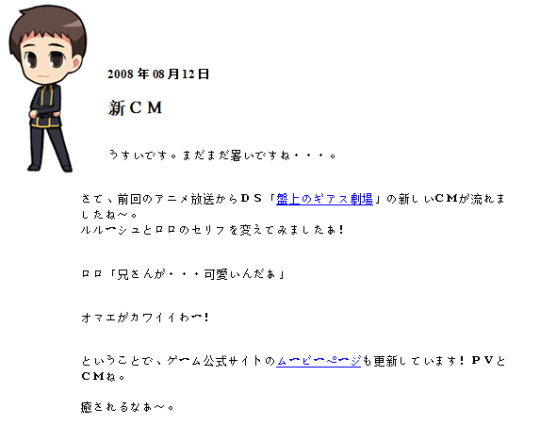
“So, since the anime’s last episode aired, there’s a new DS ‘Banjou no Geass Gekijou’ advertisement. We tried changing Lelouch and Rolo’s lines! Rolo 'Niisan... is cute' You are the one who’s cute-!”
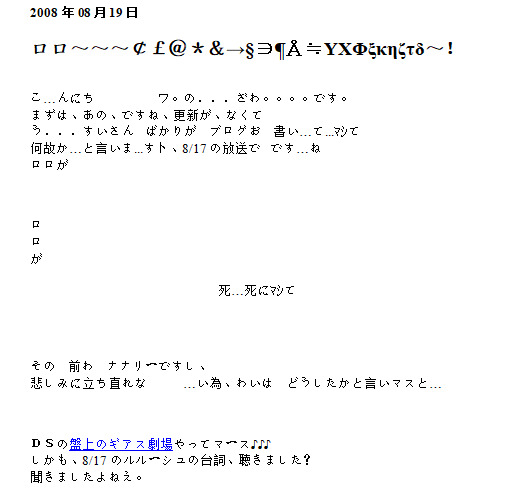
“Good... mor ning. It’s No... zawa... First, um, yeah, I haven’t posted updates. U.... Usui san is the only one who... was... writing... If you’re... wondering... why, on 17th August’s broadcast... Rolo Rolo d... died”
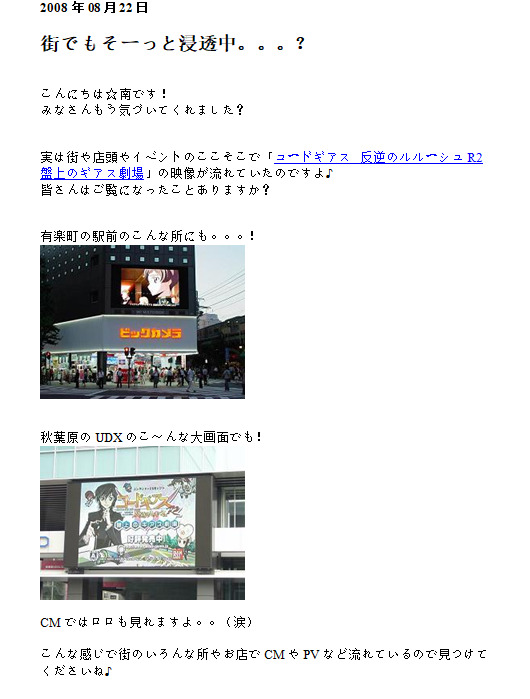
“You can see Rolo in the advertisement... (tear)”

“Lelouch’s emperor outfit... I wanted Rolo to see it” ----- It’s nice to know the staff was allowed to openly fangirl about their favorite characters. Although we already knew that from Sakou-san...
10 notes
·
View notes
Note
Idk if you’ve ever talked about it before, but how does Mammon speak in Japanese? In the translation, he speaks kinda rough and casual (maybe a bit of a southern USA flair? he uses y’all once or twice iirc) Does he have a particular accent or dialect in the OG text?
Oh, Mammon might be hard to break down, but I’ll see what I can do!
So I don’t think Mammon has any particular accent, per se? I think he’s just very informal.
From what I’ve noticed, Mammon’s speech is characterized by informal phrasing and some phonetic changes. I don’t think it goes into any actual ヤンキー (”delinquent youth”) territory, but I might be wrong as I don’t have any experience with that subculture. Regardless, it’s pretty rough, and very informal.
The following example sentences all come from the phone call where he cancels your plans (I think it’s intimacy 25?), his home screen dialogue, and the current Halloween event.
And this time more than any before, Japanese is not my first language and I have never lived in Japan, so if you find anything incorrect about the content below, please let me know so I can fix it.
---Informal Phrasing---
Japanese has lot of different ways to say the same thing with varying levels of politeness. Mammon tends to use (one of) the most direct ways of saying things.
It’s important to remember though that a lot of these “direct” things are characteristic of male speech in general, and I won’t go over those. Mammon says やつ (guy, basically) to refer to others sometimes, but so does Lucifer. Likewise, it’d be weirder if he didn’t use the dictionary verb form most of the time. There might be some that I describe even though they aren’t particularly unique to Mammon, because I’m not an expert on masc-coded Japanese.
悪い!! (warui)
(Phone call) This literally means “bad,” but in this context it’s “my bad” or “sorry.” It’s a rough way to say it, rougher than ごめん (gomen), which I know Levi says off the top of my head, and すまない (sumanai), which I know Lucifer says.
If you need to apologize in Japanese, I think it’s best to stick to すみません (sumimasen) or ごめなさい (gomenasai) to avoid accidentally coming off as too rude or too stiff.
許せ!! (yuruse)
(Phone call) This means “forgive me,” but like. As a command. A pretty demanding one at that. An example you’ve probably heard is when a man yells やめろ (yamero) to make someone stop what they’re doing.
その時は何があっても予定を空けろよ! (sono ji wa nani ga attemo yotei wo akero yo)
(Phone call) Here’s the imperative again. 空けろ (akero) is the command form of 空ける (akeru), which here means to clear your schedule (予定 is schedule). The よ (yo) at the end softens the command a little. The sentence means “At that time, no matter what you’ve got going on, clear your schedule!”
A softer way to say it would be 空けて (akete), and even softer would be 空けてください (akete kudasai). I’m pretty sure Mammon isn’t the only character to use the imperative like this, but he’s certainly uses it a lot.
館中の掃除を言いつけてきやがって…… (yakatachuu no souji wo ii tsuketeki yagatte)
(Phone call) You can tag やがる (yagaru) onto a verb to show your contempt for someone’s actions. You hate that they did something. Like most of these, it’s pretty harsh. The sentence means “He had the nerve to order me to clean the house,” but with the strength of やがって, “He fucking ordered me to” might be closer in attitude.
近いうちにまた誘ってやるから (chikaiuchi ni mata sasotte yaru kara)
(Phone call) If you read the Levi post, you might remember that やる (yaru) is a more colloquial way to say “to do” than する (suru). It’s also a more colloquial way to say あげる (ageru), “to give.” It used to imply that the recipient was on equal or lower standing with you, but I don’t think that’s really the case anymore except for how it’s not really a polite phrasing. Attached to a verb, both あげる and やる imply a favor is being done. This means “I’ll invite you out again soon before long, so”
---Phonetic Shift---
In general, the most common phoneme shifts in Mammon’s lines are cutting the middle and monophthongization. Cutting the middle is a term I’m making up for the sake of this post and is exactly what it sounds like: lengthening the first syllable in place of the next ones. Monophthongization is when a vowel made of two sounds (diphthong) is pronounced as one sound (monophthong). In the case of rough Japanese that we’re working with, that usually means <ai> and <oi> turning into <ee>.
そのなんつーか…… (Sono nan tsuuka......)
(Phone call) つーか (tsuuka) is short for というか (to iu ka). You can see how “to iu” assimilates to “tsuu,” especially if you say というか a few times fast. なんつーか/何というか means “How should I put it?”
だぁっ!わーったよ!! (Da-! waatta yo)
(A Devildom Halloween, 1-3) わーった (waatta) is from わかった (wakatta), which means “I get it.”
そりゃ傑作だぜ! (sorya kessaku daze)
(A Devildom Halloween, 2-16) そりゃ (sorya) is a shortened それは (sore wa), “that is.” Also, I’m not sure where else to put this, but ぜ (ze) is a very strong assertive particle that I don’t think many people actually use anymore irl. The line is “That’s a great joke!”
すっげースピー��で鞭とんでくるんだけど! (suggee supiido de muchi tondekurun dakedo)
(Phone call) Here we start the examples of monophthongization, which is probably the worst word you’ve had to read in a while but I promise is the easiest phonetic concept to understand here.
すっげー (suggee) comes from すっごい (suggoi), which means either amazing or terrible, depending on the context. Like I said before, <oi> often simplifies to <ee> (the second “e” is written either ー or え). The line means “The whip’s gonna come down real fast.” すっげー is emphasizing the speed.
By the way, やばい (yabai) also means amazing or terrible, based on context, and can be changed to やべー (yabee) in the same way. Mammon’s said that before too, but I don’t think it’s in my example pool.
あー…金降ってこねえかなー (Aa... kane futte konee kanaa)
(Home screen) This time, the negative こない (konai) turns into こねえ (konee), with the same <ai> --> <ee> shift. This time, it got written as ねえ instead of ねー. This is his “wish it’d rain money” line, and the translation is basically the same.
うるせぇ…… (urusee)
(A Devildom Halloween, 2-13) うるせぇ is from うるさい (urusai), which means “shut up.” This time the second え is the smaller ぇ!
おっせえよ。俺を待たすんじゃねえ (ossee yo. ore wo matasunjanee)
(Home screen) We’ve got two here, with 遅い (osoi), late, turning into おっせえ (ossee), and 待たすな (matasu na) becoming 待たすんじゃねえ (matasunjanee). Putting んじゃない where a な would normally be makes it a rough-sounding command. And then the ない turned into ねえ like tends to happen with Mammon.
The line is “You’re late. Don’t keep me waiting.”
気安くさわんな! (kiyasuku sawanna)
(Home screen, UR+ animation) This could possibly be in the first section too, idk, but. The general way to say “don’t touch me” is 触らないで (sawaranaide), and a more casual way to say it is 触るな (sawaru na). Mammon takes it a step further, and drops the る to say さわんな (sawanna). Levi uses the 触るな style, so I assume Mammon’s style is pretty noticeably informal.
他人の為に何か買ってヤンなきゃならねぇんだ! (tanin no tame ni nanka katte yannakya naraneenda)
(A Devildom Halloween, 2-13) やらなきゃならない (yaranakya naranai), is already a pretty casual way to say “have to.” Mammon’s version uses the same んな as the last line, turning やらなきゃ into ヤンなきゃ (yannakya). Also notice the switch from hiragana to katakana, which is often used to convey the conversational tone. And then ない once again becomes ねぇ! The line is “Why do I have to buy something for someone else?!”
And last but not least... そうだ、殿下。 言い忘れてた (souda, denka. ii wasureteta)
(A Devildom Halloween, 2-23) This line means, “that’s right, your highness. We forgot to say.” Why is this one last? Mammon says this line to Diavolo. From what I’ve seen it’s about the same level of politeness that Lucifer uses when talking to Diavolo.
It’s worth noting though that Lucifer and Mammon both speak casually to Diavolo.
So this isn’t organized at all, but I hope this gave you an idea of how Mammon’s idiolect ended up giving him a distinct one in the localization!
This is always a hot topic with Mammon’s portrayal as a POC character, so I need to say that I don’t know enough about Japanese subculture and language codes to say anything for sure about whether this makes him sound “uneducated.” Impolite, definitely, but “uneducated,” I don’t know. Regardless, the connotation definitely exists in how he’s written in English. And with that I’d like to remind everyone that your idiolect says nothing about your intelligence. Don’t judge a person’s worth by how many big words they use.
71 notes
·
View notes
Text
Sora and Xehanort’s Final Conversation: Japanese and English Comparison
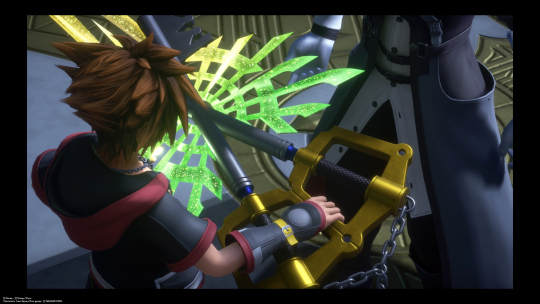
This is the fourth in a series of translation posts I’ve done about KH3. The first three were about Sora and Kairi’s scenes in KH3, but this one will be about Sora and Xehanort’s final conversation.
Here’s a general key for the kind of analysis I like to do:
JP: Official Japanese Dialogue
EN: Official English Dialogue
TR: My Translation (usually more literal and thus more stilted than the official English version. I’m not using natural-sounding English in order to stick as close to the Japanese versions of the lines as possible for the purpose of analysis)
Notes: things I found interesting, grammatical points, extra thoughts, etc.
One last note: media doesn’t exist in a vacuum. Every work of art must be viewed through the cultural lens of the people who made it. Kingdom Hearts, for all its ties to Disney, is still very much a Japanese game, so it should be analyzed in light of that.
With that in mind, let’s continue.
After you defeat Xehanort, the cutscene opens with this shot of Kingdom Hearts:

The camera zooms out:

And we get this shot of Scala ad Caelum:

Quick note on the name: it means “Stairway to Heaven” or “Stairway to the Sky” in Latin (according to a quick check - my knowledge of Latin is rudimentary at best). Caelum is a part of Noctis’s name (of FFXV fame), and, of course, Sora means sky in Japanese, so the link between Sora and this world is clear.
This shot of the sky really emphasizes this fact, and note that night is already starting to fade as a new day dawns:

The camera pans down...

...and Xehanort is standing on a white/light square, Donald and Goofy are standing on the gold anchor-like thing, and Sora is standing on a black/dark square. Sora and Xehanort are standing on opposite sides; Xehanort on the white “square,” Sora on the black “square,” like two kings facing each other off in a game of chess.
Is it symbolic? Probably. It’s interesting that Xehanort is on the white “square” and Sora on the black one, as perhaps we might expect the opposite, as Sora is on the side of good and Xehanort is on the side of evil. Perhaps it also foreshadows Sora’s final fate - to be lost, to be alone, while Xehanort gets to... ascend to the light with Eraqus? Hard to say.
Sora is not alone here, though; here at least he has Donald and Goofy with him.
We get a slightly closer look at this design...
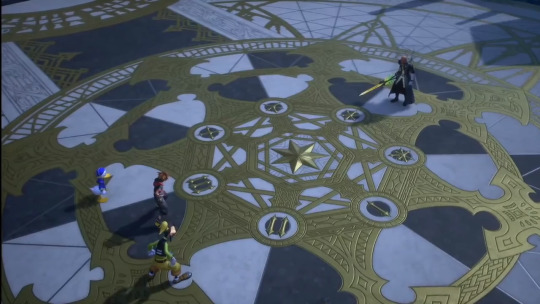
...and we can see that there are seven numbers, starting with I on the bottom-right corner and moving clockwise. I, II, and III use Roman numerals, but the other letters do not; they use a star-shaped pattern of sorts. Sora is standing by the III. Maybe because this game is Kingdom Hearts III?
Three is also a number associated with completion, wholeness, perfection and even divinity in Christianity, and Nomura has used Christian imagery in the series before, so... Sora will be a god/have godlike powers someday confirmed?
I kid, I kid. This is reaching at straws a bit, but it’s fun to speculate, and Sora’s placement here is interesting to note nonetheless. The number seven is also significant because it’s the number of the Guardians of Light and the number of the Foretellers plus Luxu and the Master of Masters. It’s another number that tends to be associated with wholeness/perfection as well.
Continuing on, the camera moves to this shot of Xehanort’s leg:

And then he drops the χ-Blade in a shot that is a visual callback to an earlier shot in the game...
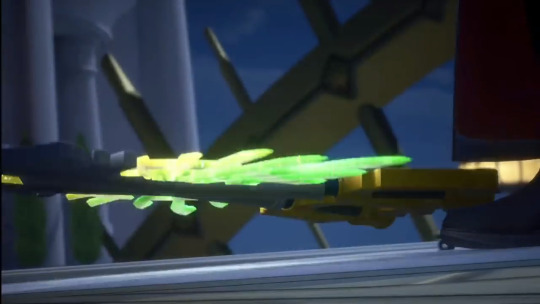
...namely, when Sora’s friends were torn from him and he likewise dropped his Keyblade:

Xehanort collapses to the ground at Sora’s feet with black smoke wafting off him (probably a sign he’s fading)...
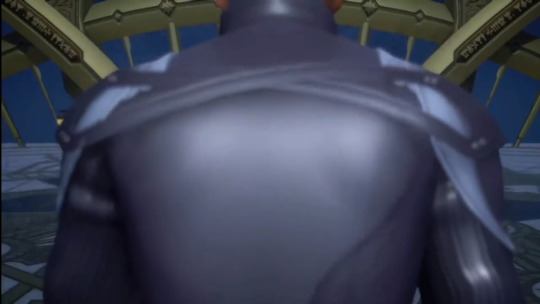


...much like how Sora dropped to the ground at the Keyblade Graveyard (minus the smoke):

As I said in an earlier analysis, this is significant because Xehanort is no longer towering over him. They’re on equal footing now. Sora has dragged him off his high horse and defeated him, and Xehanort is a guy who loves to tower over people...


...whereas Sora lowers himself to be at the same level as his smaller friends:

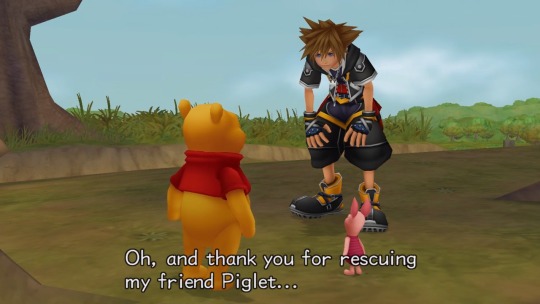

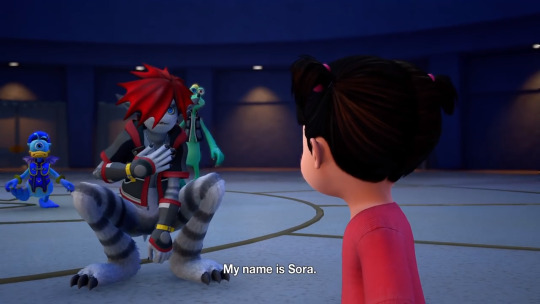

Not only that, Sora has actually managed to get Xehanort to collapse to the ground when before he had collapsed to the ground over his grief at losing his friends, culminating in the moment he loses Kairi...
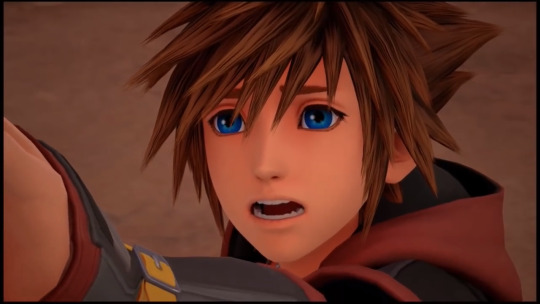






...and then his grief over Kairi’s death:
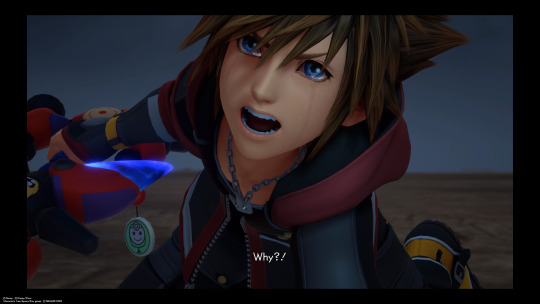

But not here. He’s the one standing over Xehanort for once:

Man was this satisfying to see.
Sora, Donald, and Goofy are all panting in this scene, indicating how grueling the battle was for them. Look at Donald and Goofy’s glares, too:


Xehanort tries to lift himself up...


...to no avail. He’s too weak, so he collapses back to the ground:


JP なぜだ なぜこんなー
EN Why... How...
TR Why... Why like thisー
Notes: No real significant difference here. In both versions Xehanort seems to be questioning how he was defeated like this, implying he’s in a state of disbelief that he was defeated by these three in particular.
We can see he isn’t doing so well, and he winces in pain:

His pose is reminiscent of Sora’s pose when he despairs. Sora’s fists are clenched, and Xehanort has one fist clenched as well.

The camera cuts to Sora...
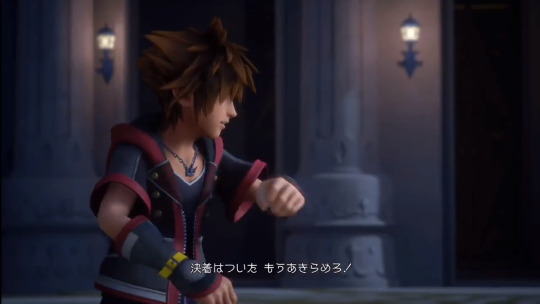
...who flings his arm out...
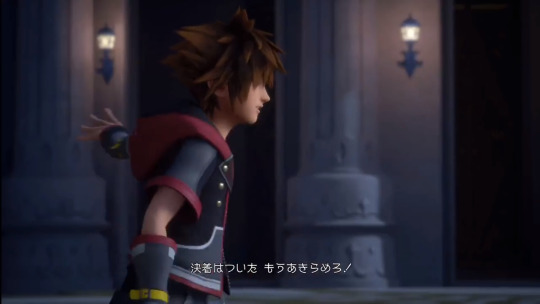
...and then clenches his fist again. He sounds furious/fed up with the way Miyu Irino delivers his lines, too:
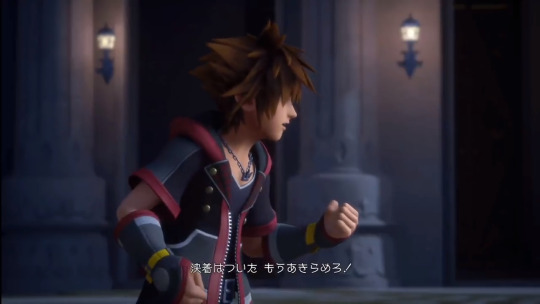
JP 決着はついた もうあきらめろ!
EN It’s over now! You lost!
TR It’s over. Give up already!
Notes: “It’s over” can also mean something like “it’s settled” here. They fought, Sora (and Donald and Goofy) won, Xehanort lost, the matter has been decided. And when Sora tells Xehanort to give up, he’s commanding him to do so by using the imperative form of this verb, akiramero. In other words, he’s had it with Xehanort at this point and is sick of fighting him.
But Xehanort isn’t about to give up that easily:


JP 見るがいい もう手遅れだ
EN No, look... You are too late...
TR Take a look. You’re too late/you lost your final chance.
Notes: “Take a look” is literally “(to) look is good,” but I changed it to make sense in English/to better match the pragmatic meaning of the Japanese sentence instead of the literal meaning. Even in defeat Xehanort won’t give in; he taunts Sora by telling him it’s too late already anyway.
Sora and Donald inhale sharply and look up...


...to see Kingdom Hearts looming above them:

Something is happening. Light is starting to leech off of it in a way that almost looks like solar flares:

Sora and Donald both notice. Look at their concerned faces:
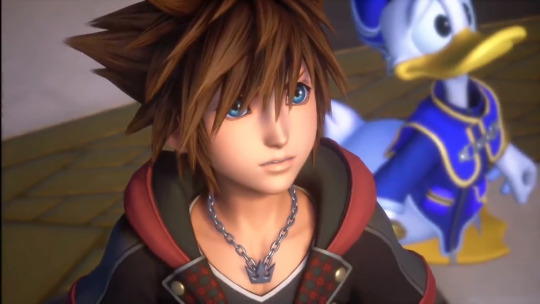
Sora gasps...
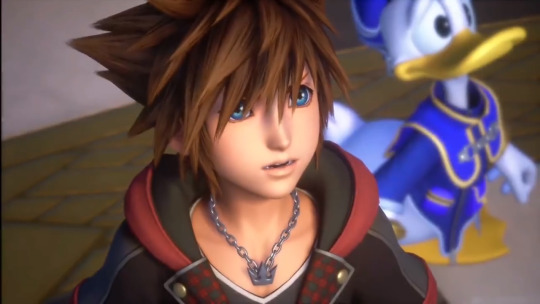
...and tilts his head a little higher:
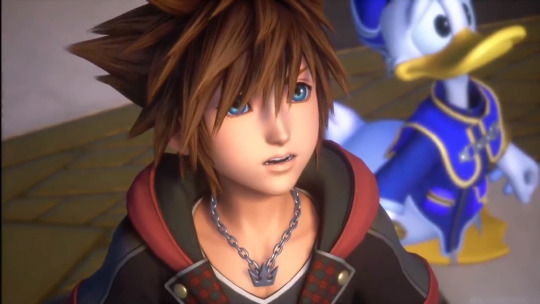
As Donald and Goofy confer about what’s going on, Sora keeps looking up at Kingdom Hearts:

JP 手遅れなの?
EN Are we really?
TR Are (we really) too late?
Notes: Goofy uses the construction ~nano here at the end of his sentence to check for confirmation from Donald, hence the English version’s use of the word “really” here.
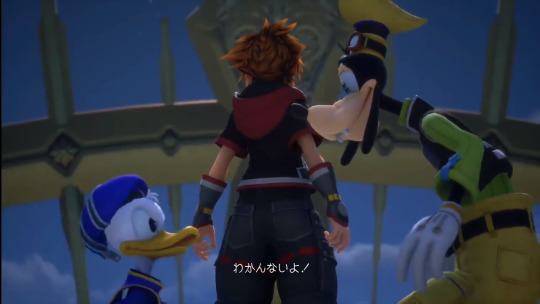
JP わかんないよ!
EN I don’t know.
TR I don’t know!
Notes: Donald speaks really colloquially here and it’s pretty cute; instead of the standard wakaranai he uses wakannai. He also uses the emphatic particle yo at the end of the sentence to make it clear he has no idea either.
The camera cuts back to Sora, and he is furious about what’s happening. Note his gritted teeth, curled lip, and eyebrows tilted downward in a frown:


He even leans forward as he chews Xehanort out:
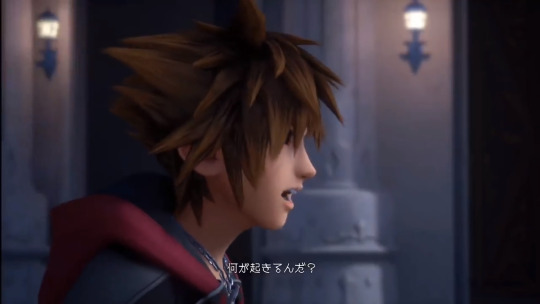
JP 何が起きるんだ?
EN What’s gonna happen?
TR What’s gonna happen?
Notes: Sora uses the ~nda form here to indicate he wants an explanation and he wants an answer.
As he finishes his sentence, he is leaning forward and still glaring:
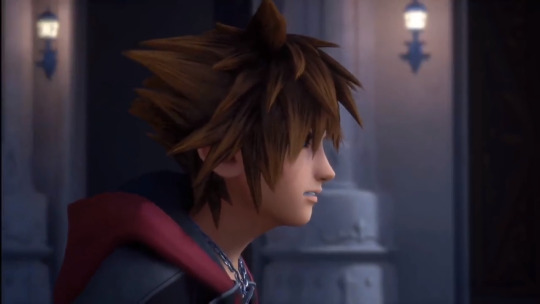
The camera cuts to a shot of Xehanort still on the ground at Sora, Donald, and Goofy’s feet. Note Sora’s clenched fists and how he’s hunched over:

Xehanort tries to get up again, and you can see Sora relax a little:
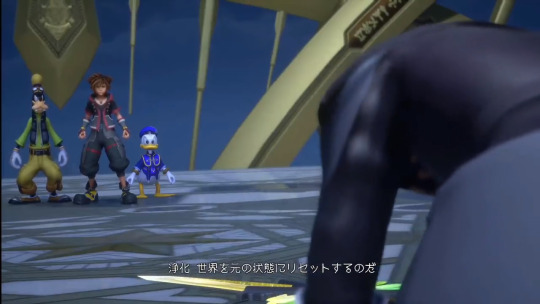
JP 浄化 世界を元の状態にリセットするのだ
EN A purge... The World will be returned whence it started.
TR Purification. The World will be reset to its original state/condition.
Notes: Xehanort uses the construction ~noda at the end of the sentence to give an explanation. Sora asked for it, and he’s giving it.
The word I translated as “original” here, moto, can mean a number of things, including “origin,” “source,” “foundation,” or even “root,” depending on context. I’m mentioning it here because it shows up again later on in Xehanort’s story, and I have to translate it differently for it to make sense in English.
Xehanort says “whence” in English to indicate he is speaking in a narrative fashion, as “whence” is no longer commonly used in English anymore.
The English version of Kingdom Hearts renders sekai as World with a capital W here to refer to the overall World that existed before it was split into the smaller worlds you now visit on the Gummi Ship, and I maintained that distinction here. Japanese kanji and kana don’t have capital or lowercase letters, so this is something the English localization uses to make the distinction between the World and the worlds clear for the English-speaking fans.
The word the English version translated as “purge,” jōka, can mean a purge or purification. Looking it up on Google, I found the following definition:
よごれや悪を取り除いて、清浄・清潔にすること。
To remove things like dirt and evil, and make them pure/clean.
So in other words, the World will be purged/purified and reset to its original condition/the state it was in at the beginning. That was Xehanort’s goal.
Continuing on, Sora fully straightens and lets out a surprised noise, his hands no longer in fists:

Xehanort manages to lift himself up to a kneeling position, and he is clutching his side, clearly still injured:
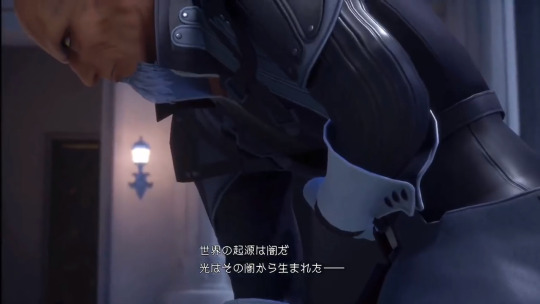
JP 世界の起源は闇だ 光はその闇から生まれたー
EN The World began in darkness. And from that darkness came light.
TR The origin/beginning of the World is darkness. From that darkness, light was born.
Notes: The word I translated as “born” umareta, can also mean “come from/came from,” hence why the English version went with “came” here. In the second sentence I rearranged the order a little to make better sense in English; in Japanese it’s more literally, “Light, from that darkness was born.”
Also, just as a quick note that will apply throughout this analysis: Japanese does not have articles, so any “the” and “a” and “an” in the English version or translation have been implied from context and added in the translation. Japanese simply does not grammaticalize the definite/indefinite distinction the way English (and a lot of other European languages) does.

JP そして その光から人が生まれ 心が生まれた
EN From the light came the people, and the people had hearts.
TR Then, from that light people were born, and hearts were born.
Notes: The English translation did a good job of maintaining the story-like language Xehanort uses here. In Japanese he uses umareta or a variation of it several times at the end of his phrases to form nice parallels, which the English version translates as “came” in most cases.
Anyway, according to Xehanort’s story, the world began in darkness. Then, from that darkness came light, and from that light came people, and then came hearts. But the story doesn’t end there.
Xehanort winces again here, indicating he’s still in a lot of pain:

The camera cuts to this shot, and Xehanort is standing by the number six, which is one number short of the number of completion/perfection (in Christian thought at least), seven. Because it falls short of seven, it can mean imperfection. It is also is the number associated with humanity, as in the creation story in Genesis, humanity was created on the sixth day.
Significant? Maybe, maybe not. Xehanort certainly falls short of the mark of perfection, that’s for sure. He wore armor reminiscent of a goat earlier on...
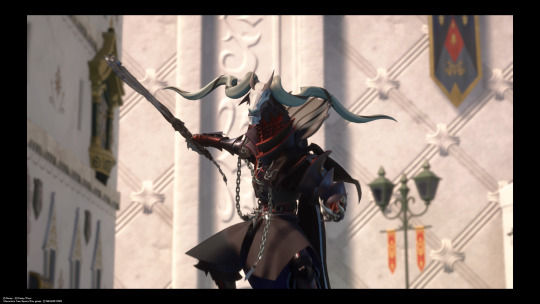
...and goats are associated with the devil, so...
Xehanort as a fallen angel of light makes a lot of sense, actually. As the Kingdom Hearts version of Lucifer, as it were. Especially with his whole speech in this scene about wanting to reset the World to get rid of the darkness and bring back the original light.
In the next line, he also talks about how evil came into the World while standing by the number associated with imperfection and/or humanity, so... actually yeah, maybe this is all linked together:
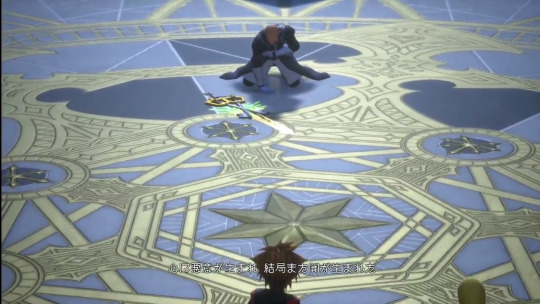
JP 心に悪意が生まれ 結局また闇が生まれた
EN Evil burgeoned in those hearts, begetting more darkness.
TR In people’s hearts evil/malice was born, and finally, darkness was born again.
Notes: This is where the direct umareta/“came” parallel is a little lost in English, though the meaning is maintained in a way that makes Xehanort’s story sound very poetic. Xehanort uses words like “beget” which are typically only used in religious contexts in modern English to add a sense of gravity and religious gravitas to his speech.
Speaking of religion, the Japanese version of these lines strikes me as very cyclical. The World began in darkness. Then, from that darkness light was born, and from that light people were born, and then hearts. From hearts evil/malice was born, and in the end darkness was born again. The World began in darkness and darkness is born anew; the cycle repeats.
This type of language reminds me of Buddhism, with its cycle of birth, suffering, death, and rebirth. This isn’t surprising, as Kingdom Hearts is a Japanese game and Buddhism (along with Shintoism) were the majority religions for a very long time in Japan (though less so in modern times, as more and more people are not religious nowadays). Perhaps Xehanort is trying to break this cycle (or a similar cycle) by resetting the universe.
The word for evil/malice here, akui, is also often used in legal contexts to refer to crimes that were done in bad faith. When I googled the word, I also got this definition:
他人や物事に対していだく悪い感情、または見方。
Bad feelings or perspectives towards other people and things (among other things).
The word I translated “finally” here, kekkyoku, I am noting here because I will have to translate it differently later on but wanted to point out the parallel in the original version. It can also mean “in the end.”
Continuing on, the camera pans to Sora, Donald, and Goofy, still standing by that III:
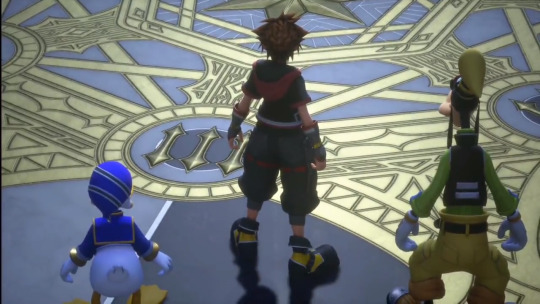
Then cuts to Donald, who looks very distressed by Xehanort’s story:
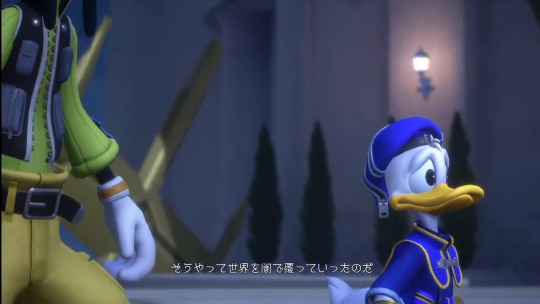
JP そうやって世界を闇で覆っていったのだ
EN And that darkness spread across the World like a plague.
TR In this way, the World was covered in darkness.
Notes: Xehanort uses the ~noda construction here again at the end of the sentence to give an explanation.
The word I translated as “was covered,” ōtteitta, can also mean “to hide,” “to conceal,” “to wrap,” “to disguise.” It can be used in the context of snow or water covering land, for example. In this sentence I’m sort of getting the sense that the darkness cloaked the World and covered it.
The English version goes with the plague metaphor, which immediately brings forth to mind images of impurity/dirt/disease in association with darkness. Which is fitting for the overall tone of the scene, as Xehanort claims he wanted to purge/purify the World.
The camera changes to a shot of Sora that begins at his heart and pans up to his face along with a line that very well might have been meant as foreshadowing:

JP 世界に生まれた光という希望も 結局は闇になる
EN The light, the symbol of the World’s hope, was devoured by shadow.
TR In the end, the hope that is the light born in the World also becomes darkness.
Notes: The phrase I translated as “in the end” is the same word I translated as “finally” earlier, kekkyoku. Just wanted to point out that parallel because Xehanort is deliberately reusing certain words over and over again here in the telling of his story.
The Japanese version says that even the light becomes darkness again, whereas the English version says that the light was devoured by darkness. The end result is the same though: darkness.
I think it’s very telling that this line is spoken when Sora is shown; he is the light and the symbol of the World’s hope, in a way, and earlier in this scene we saw him transform into darkness...
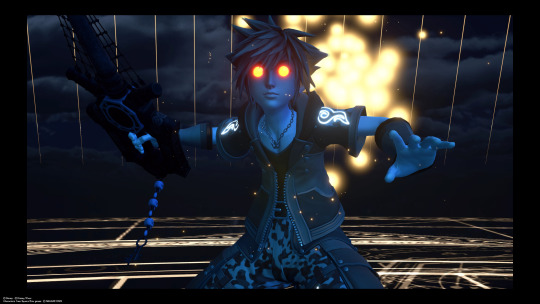
...and at the end of this game he will be lost as well.
Continuing on:
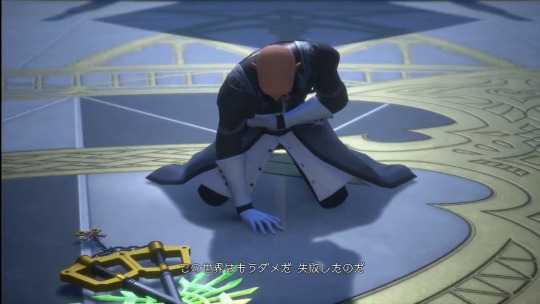
JP この世界はもうダメだ 失敗したのだ
EN Leaving nothing but ruin... An utter failure.
TR This World is no good anymore. It’s a failure.
Notes: Xehanort uses the ~noda construction here again at the end of the sentence to give an explanation, and the phrase I translated as “It’s a failure” is more literally, “It failed.”
The phrasing is a little different in the Japanese and English versions, but the overall meaning/intent is the same: Xehanort thinks this World is a failure and that a new one is needed. Xehanort delivers these lines with a lot of emotion, too; clearly he feels strongly about this.
The camera switches to a shot of Kingdom Hearts again:
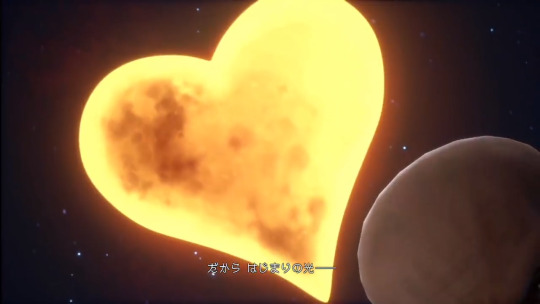
JP だから はじまりの光ー
EN But, the first lightー
TR So, the first lightー
Notes: The Japanese version is more literally, “(the) light of the beginning.”

JP キングダムハーツによって 世界を元からはじめればいい
EN the light of Kingdom Heartsー it can give us a new start.
TR by (using) Kingdom Hearts, (we) should start the World from the beginning.
Notes: The word moto is used here again, which I translated as “original” earlier but “beginning” here.
There is no “we” pronoun in the Japanese version; Japanese does not require pronouns the same way English does and they can often be dropped and implied/inferred from context. I added in the “we” for it to make sense in English.
Xehanort uses the ~baii construction, which he’ll use again here soon. It’s a conditional grammar construction and it’s used here to indicate what Xehanort thinks is the best course of action.
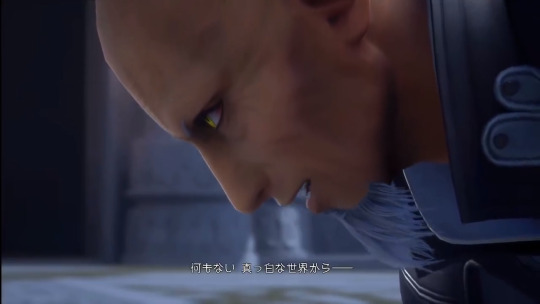
JP 何もない 真っ白な世界からー
EN An empty World, pure and bright...
TR Nothing/empty... from a pure/blank Worldー
Notes: Kept the translation very literal here to make it clear what exactly the Japanese version said.
While it’s true masshiro can mean “blank,” it can also mean “pure.” Think in the sense of “pure white.” For a more detailed Japanese definition, feel free to check this dictionary entry out. I saw debate over whether the English version mistranslated this part and thus messed up Xehanort’s motives, but as masshiro can mean blank or pure, I’d say the translators handled this part very well, especially with some of the other phrasing Xehanort uses in this scene (like purify/purge).
Continuing on, Sora doesn’t let Xehanort finish his grand speech; he interrupts him in a very satisfying “shut up and stop rambling” moment:
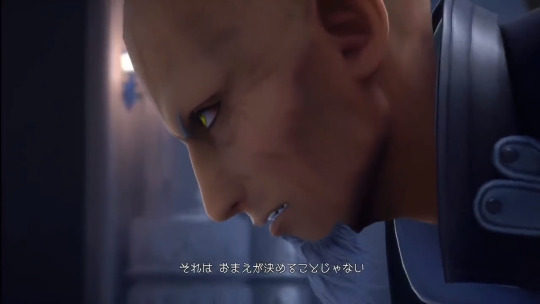
JP それは おまえが決めることじゃない
EN It wasn’t your decision to make.
TR That’s not your decision (to make). / That’s not something (for) you (to) decide.
Notes: The word for “decision/decide,” kimeru, I will have to translate as something else later on for it to flow well in English, but the word used in the Japanese version is kimeru throughout.
Anyway, Xehanort is not happy to hear this and clutches the χ-Blade:

And struggles to his feet as Sora, Donald, and Goofy watch:
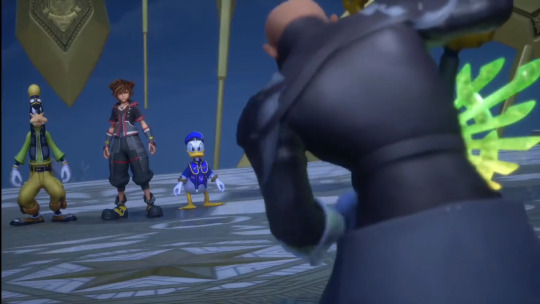
He’s still weak, though, so he has to brace himself with the χ-Blade (props to the χ-Blade for actually being sharp enough to pierce the ground):

Then speaks again:
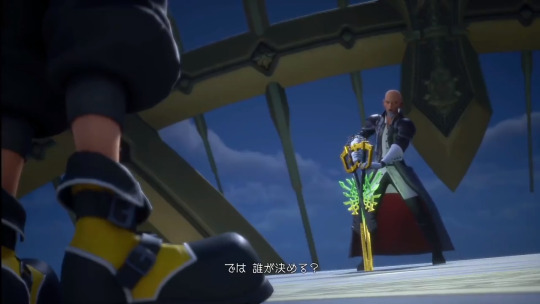
JP では 誰が決める?
EN Then whose was it?
TR Then who (gets to) decide?
Notes: The word for "decide” here is kimeru again.
Xehanort holds the χ-Blade up before holding it at his side:

And Sora reacts, not liking how Xehanort is holding the χ-Blade like that again:

But, he very tellingly says nothing. Perhaps because he doesn’t have an answer. Perhaps because he knows Xehanort thinks he will claim he should have been the one to decide instead of Xehanort. But Sora isn’t arrogant; he doesn’t think he should make this kind of decision for people because he knows he has no right to. So he says nothing instead.
Xehanort misunderstands Sora’s silence as not understanding, and so tries to explain to him. Here you can even see him do his weird finger thing before he clenches his fist:
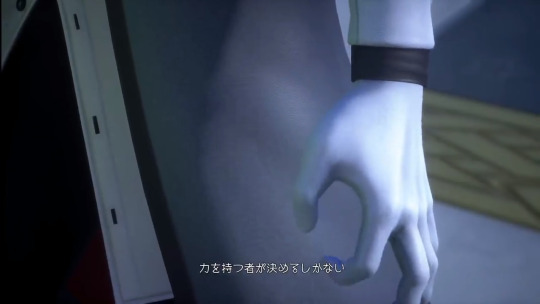
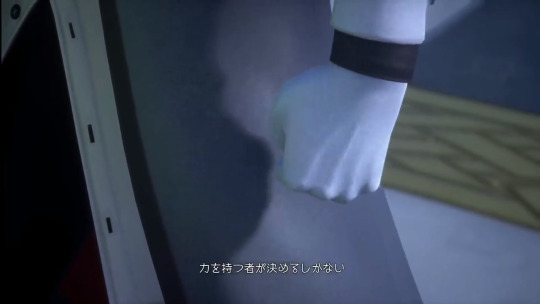
JP 力を持つ者が決めるしかない
EN The World needs someone to stand up and lead.
TR Only those who have power can decide.
Notes: Here we have Xehanort’s whole philosophy in a nutshell. He thinks that only the people with power should be allowed to decide. Took long enough, but he’s finally giving Sora (and the audience) a straight answer.
The word for "decide” here is kimeru again. The word for “only,” shikanai, means something like “there is no choice but to~.” The word I translated as “those,” mono, more literally means “people.” Xehanort’s saying the only option here is for the people with power to decide.
The Japanese version gives a bit of a “survival of the fittest, the powerful will rule over the weak” sort of vibe with the phrasing. He’s pulling from the evil dictator textbook, basically, and the English version diverges from the Japanese version here and phrases the whole thing in terms of leadership. Yes, it’s a noticeable change, but I think it works well, plus it gives Sora some really awesome lines here in a bit.

JP 力なき者は強者の決めた世界で身勝手に闇を生み出すだけだ
EN Someone strong, to stop the weak from polluting the World with their endless darkness.
TR Those without power, in the World the strong have chosen, only selfishly bring forth darkness.
Notes: “Chosen” was kimeta, the past tense of kimeru, in the Japanese version.
The word I translated as “the strong,” kyōsha, is literally “strong person,” when you look at the kanji. Xehanort defines weak people as those without power and strong people as those with it. He blames the weak for bringing darkness into the World, says it’s all they do, and calls their behavior selfish.
You sure get the vibe that he thinks the weak are only capable of bringing forth more and more darkness, which is probably why in his mind he is justified in resetting the universe, murdering Kairi, attempting to murder Sora and the rest of his friends, norting Terra for years, trying to nort Sora, a murder attempt on his best friend, etc., etc. in order to bring about a new World. It’s all for the best in the end, right? The ends justify the means, don’t they?
No. They absolutely do not.
And speaking of which, what on earth was he thinking with murdering Kairi? She’s one of the few hearts that is made of the pure light he claims to love so much. He wants that light back so badly he’s resetting the universe, and yet one of the few people it exists in naturally he decides to... kill off? For motivation Sora didn’t need because he already had plenty of motivation to fight him? What?
In other words, Xehanort is a massive hypocrite who can’t even behave consistently with his own beliefs. What else is new.
Continuing on, the camera focuses on his face in profile here:

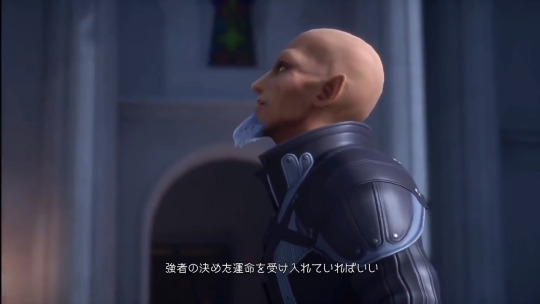
JP 強者の決めた運命を受け入れていればいい
EN Someone to dictate their destiny.
TR (They) should accept the fate the strong have chosen.
Notes: “Chosen” was kimeta, the past tense of kimeru, in the Japanese version. The ~baii construction pops up again here to indicate what Xehanort thinks is the best course of action.
So now the strong get to decide the fate of the weak, hmmmm? Man, I wonder where I’ve heard that kind of reasoning before...
Oh yeah, that’s right. Evil dictators. Xehanort still sounds like one of those. He has delusions of grandeur, but Sora’s about to set him straight.
The camera goes to a wide angle to paint Sora and Xehanort’s ideological clash in epic strokes, with Sora on one end of the screen and Xehanort on the other. Between the two of them are three doorways with three keyholes above those doorways. Symbolic? Probably. It makes for a lovely visual even if it’s not though.
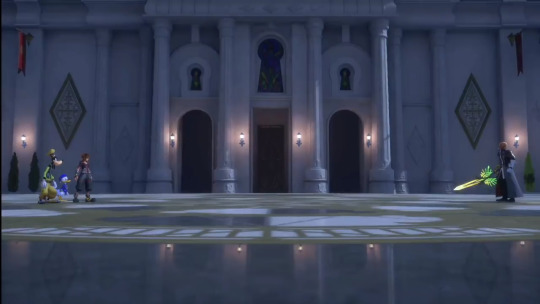
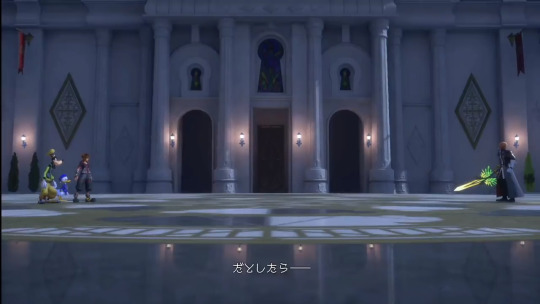
JP だとしたらー
EN If so...
TR If soー
Notes: Sora decides to entertain Xehanort’s notion for a moment. Okay, even if the social Darwinism nonsense he’s spouting is true (it’s not), does that mean Xehanort deserves to rule?
Sora’s face is shown in profile here on the left side of the screen, in contrast with Xehanort’s face being shown in profile earlier on the right side of the screen:

And Sora gives his answer:
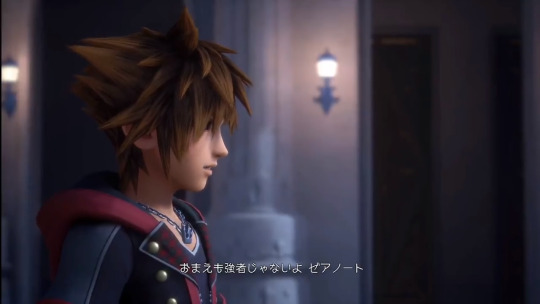
JP おまえも強者じゃないよ ゼアノート
EN you’re not that person, Xehanort.
TR you aren’t one of the strong either, Xehanort.
Notes: The Japanese version is more literally, “You also aren’t the strong/a strong person, Xehanort.”
Sora uses the derogatory/familiar pronoun for “you” here, omae, to address Xehanort, showing how little regard he has for him. He also uses the particle yo to indicate he’s imparting knowledge to Xehanort - he’s telling him that he’s not fit to decide. His sass and attitude is great here; he’s speaking like he’s qualified to instruct Xehanort on this.
I love the Japanese version of this line because he’s basically saying, “Okay, maybe all of the stuff you just said is true, but you know what? You’re not one of the strong. You’re one of the weak. You don’t deserve to rule. You don’t deserve to decide other people’s fates for them.”
The English version is fantastic too. As Xehanort’s lines in the English version earlier phrased this in terms of leadership, Sora tells him he’s not the one who should lead. He’s not fit to lead.
In both languages, Sora hands Xehanort an excellent burn.
Xehanort is displeased at hearing this:

Then makes a hmmm? noise...

...and tilts his head, waiting for Sora to say more:

And he does, and look how angry Goofy and Donald still are:
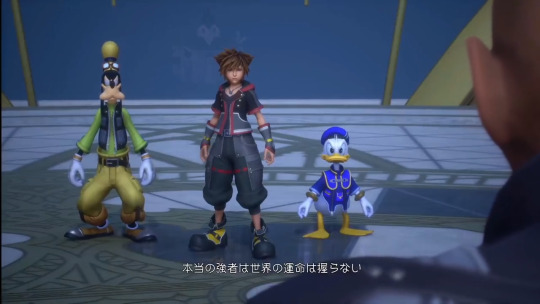
JP 本当の強者は世界の運命は握らない
EN A real leader knows that destiny is beyond his control...
TR A real/true strong person doesn’t grasp/seize (the) World’s fate/destiny.
Notes: The word for “strong person” here is still kyōsha, which I translated as “the strong” earlier. Had to tweak things a bit for the sake of English grammar. Makes sense that the English version went with “leader” to maintain the parallel throughout and avoid this problem.
In the Japanese version, the focus is on the World’s fate/destiny, probably to parallel all those other times Xehanort spoke about the World, whereas the English version focuses on destiny in general. Sora also notes that a real leader/strong person doesn’t try to control destiny or seize it for himself/herself. In fact, Sora would probably consider someone who does so to be unworthy of such power, just how he considers Xehanort unworthy of the power.
The English version adds in the pronoun “his” because again in Japanese pronouns tend to be omitted and implied from context. By saying what a real leader does here, he is saying that Xehanort is not one... and, perhaps, subtly claiming that he is one, as he has accepted his fate/destiny, whatever it may be.
The word here for fate/destiny, unmei, also pops up in Sora’s opening lines. Borrowing from an earlier analysis:
JP
奪われた世界ー
奪われた心ー
その繋がりを断ち切られてもー
それが運命ならー
歩む道は帰るべき方向を常に向いている
EN
They can take your world.
They can take your heart.
Cut you loose from all you know.
But if it’s your fate…
…then every step forward will always be a step closer to home.
TR
(My) world was stolenー
(My) heart was stolenー
(My) connection (to my friends) was even brokenー
(But even) if that’s (my) fateー
The road to walk, the way that will lead me homeー I’ll always keep facing it.
Notes: These lines show how Sora has accepted his fate, and in the KH3 Ultimania Nomura confirmed that these lines reflect Sora’s mindset at the end of the game I believe it was (someone fact check me on that though please!)
Even though Sora doesn’t say it outright, his words here could be taken to mean he thinks he’s the rightful leader here, not Xehanort, because he has accepted his fate in a way that Xehanort refuses to. At the very least, Xehanort does not deserve to rule because he’s trying to seize hold of the World’s fate/destiny.
And we see Sora follow through on this in the end; he accepts his death with dignity and saves Kairi, even knowing it will probably cost him his life.
He blinks here briefly:
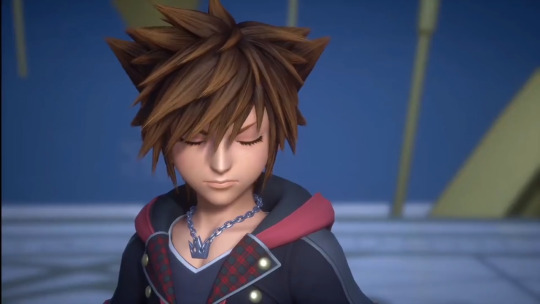
Then opens his eyes again to deliver the rest of his speech, complete with extra frowning at Xehanort. Note how his eyebrows change position:
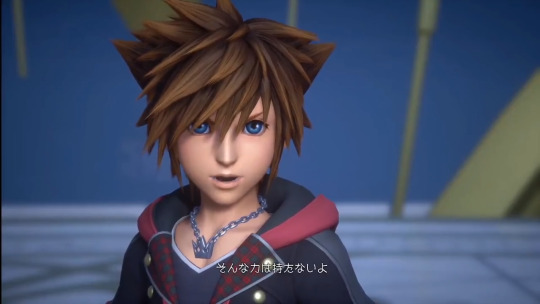
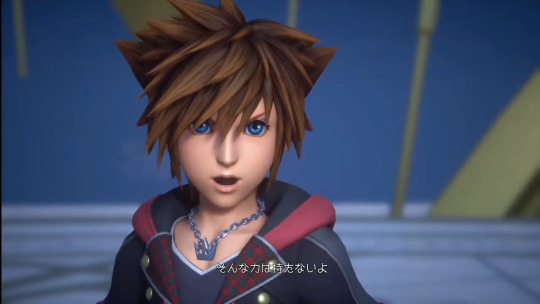
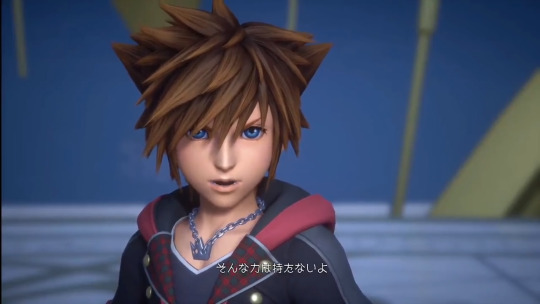
JP そんな力は持たないよ
EN and accepts that.
TR You can’t hold/keep that kind of power.
Notes: Sora flat up tells Xehanort in the Japanese version that that kind of power is not something that can be grasped, held, or kept. Fate/destiny cannot be controlled the way Xehanort is trying to.
The Japanese version does not have the word “can’t” or “you” in it; Sora more literally says, “(You) don’t hold that kind of power.”
Sora uses the particle yo here again to really emphasize that he’s telling Xehanort this.
He continues to stare Xehanort down after he finishes speaking:
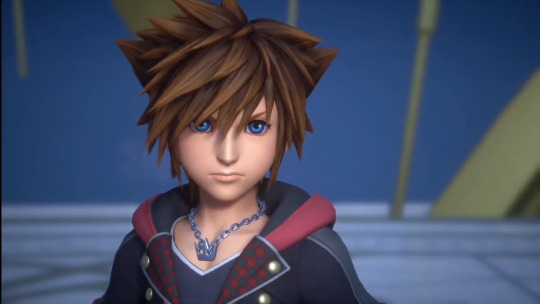
Then we get this closeup shot of Xehanort’s face...
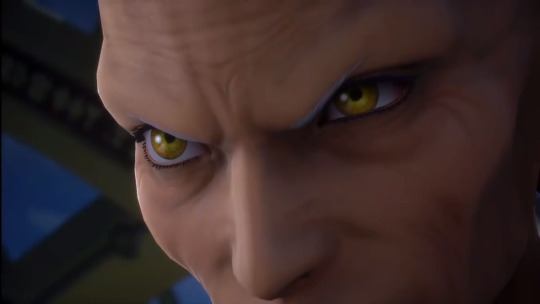
...as his eyes narrow:

The camera goes back to Sora’s face in a similar closeup shot:
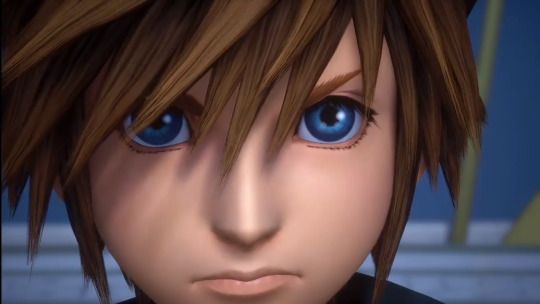
And Sora’s eyebrows tilt downwards even further as he just continues to glare at Xehanort:
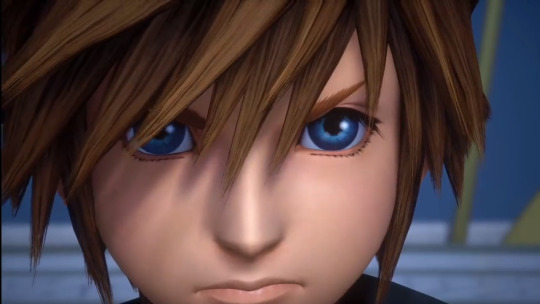
It’s a battle of wills, if you may. Who will stand down first?
The answer is Xehanort. He actually smiles, too:
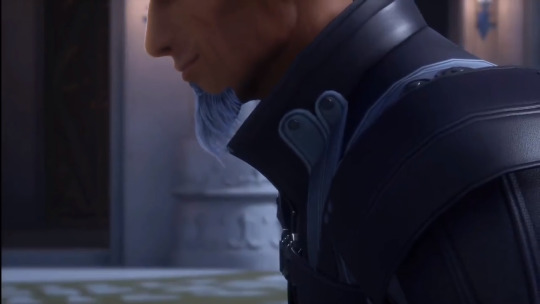
Takes a moment to gather his thoughts:

And says:

JP おまえは我が友に似ているな
EN You... make me think of an old friend.
TR You’re like my friend.
Notes: Xehanort uses the same derogatory/familiar pronoun for “you” Sora used earlier to address him, omae. Here it seems a little less hostile though. Xehanort also uses the pronoun wa here to refer to himself when in other contexts he’s used watashi, I believe?
Huh. Probably using wa here because he’s an old dude.
He also uses the particle na at the end of the sentence to express some extra emotion with his declaration here.
He even smiles a little, probably because he’s thinking back on fond memories he has of Eraqus:

Sora just stares back at him, and the background kinda looks like he’s wearing a giant crown though I admit this is a stretch. Goofy’s displeased look sure isn’t though:

The scene goes on and the others arrive, so skipping forward to this moment when Xehanort hands over the χ-Blade:
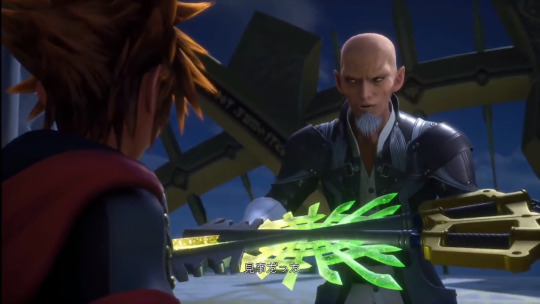
JP 見事だった
EN Very well done.
TR (You did) splendidly/admirably/excellently.
Notes: Xehanort expresses his admiration for Sora’s efforts here.
Note Sora’s shocked look:
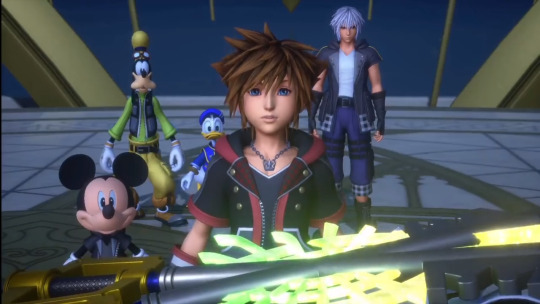
He looks down...
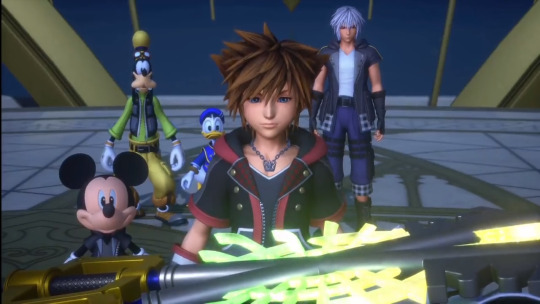
...then takes the χ-Blade. Note how one hand is on the hilt and the other hand is holding part of the χ-Blade’s wing-like things, almost like he’s admiring it:
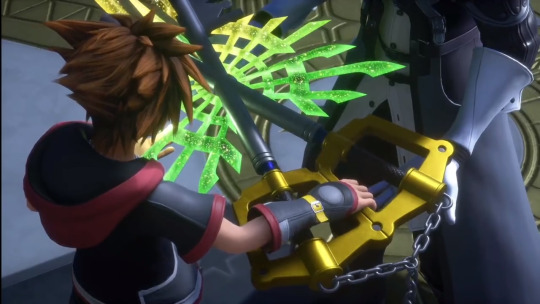
Then he takes it from Xehanort and looks up:
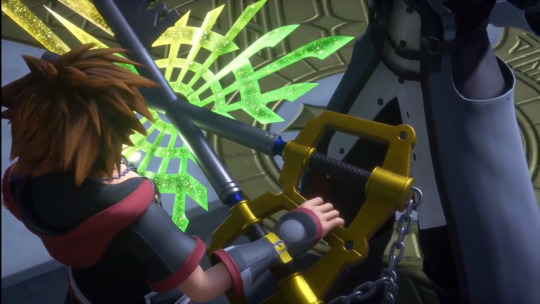
And as someone pointed out... (can’t remember who, sorry, but credit to you!) this is the first time Sora has officially been bequeathed a Keyblade by someone else. And it was Xehanort who was the one to do it.
Make of that what you will.
Screenshots are from here and here. Usual disclaimers apply about my Japanese ability and translation abilities being a work in progress, etc. Might tweak things if I notice mistakes or if people mention stuff I forgot to.
#kh3#kingdom hearts 3#kingdom hearts#sora#xehanort#kh3 spoilers#kingdom hearts 3 spoilers#kh analysis#phoenix translates#phoenix downer#phoenix plays kh3#kh translation#kh meta#long post#donald#goofy#donald duck
303 notes
·
View notes
Text
Lesson 1
Summary of sub-topics:
AはBです。 ━ (A) is (B).
AはBじゃありません 。 ━ (A) is not (B).
[Sentence] か。 ━ Question particle
AもBです。 ━ (A) is also (B).
AのB ━ (A)’s (B)
[name]さん ━ Mr./Mrs. [name]
≿━━━━━━━༺❀༻━━━━━━━≾
1. AはBです。・(A) wa (B) desu.
Translates as: A is B.
It is used to give description about something, commonly a noun.
[The particle は ・wa] - indicates that the word before it is the subject. Select a subject, add は then your statement about it.
[です・desu] - indicates judgement or assertion. It also conveys that the speaker is polite to the listener.
Example ①
A は B です。
わたし は はるか です。
I am Haruka.
Example ②
A は B です。
うずまきさん は きょうし です。
Mr. Uzumaki is a teacher.
Note: The は particle is not read as ‘ha’ but ‘wa’.
Got it? Try to translate these sentences using AはBです pattern. (You might need to use the vocabulary list here)
I am [your name].
I am Mary.
Mr. Suzuki is a doctor.
Today is Friday.
Answer key
2. AはBじゃありません・(A) wa (B) ja arimasen.
Translates as: A is not B.
Same as above but you just change です (desu) to じゃありません (ja arimasen) to make it negative. This is because じゃありません (ja arimasen) is the negative form of です (desu).
Example ①
A は B じゃありません。
わたし は はるか じゃありません 。
I am not Haruka.
Example ②
A は B じゃありません。
うずまきさん は きょうし じゃありません 。
Mr. Uzumaki is not a teacher.
Got it? Try to negate these sentences using AはB じゃありません pattern. (You might need to use the vocabulary list here)
I am [your name].
I am Mary.
Mr. Suzuki is a doctor.
Today is Friday.
Answer Key
3. [Sentence] か。・[Sentence] ka
Adding か (ka) at the end of the sentence (any sentence) can make it a question.
Example ①

Example ②

4. AもBです。・(A) mo (B) desu.
Translates as: A is also B. or A is the same as B.
[The particle も] - when placed after nouns will mean as “also”. There are lot more uses of も but let’s just take this step by step. :)
Example ①
A も B です。
すずきさん も かいしゃいん です。
Mr. Suzuki is also a company employee.
Example ②
A も B です。
わたし も がくせい です。
I am also a student.
You can also try to add か (ka) at the end of it.
Example ③
A も B です か。
やまださん も エンジニア です か。
Is Mr. Yamada also an engineer?
Got it? Try to translate these sentences using AもBです pattern. (You might need to use the vocabulary list here)
I am also a student.
She is also a teacher.
Is Mr. Mike also a teacher?
Answer Key
5. AのB・(A) no (B)
Translates as: (A)’s (B)
[The particle の] - Used for possession. A possesses B. Try to treat の (no) as the [’s] in the phrase.
Example ①
A の B
やまださん の かばん
Mr. Yamada’s bag
Example ②
A の B
けさ の あさごはん
This morning’s breakfast
For example ③ lets try to use AはBです pattern with AのB pattern.
メアリさん は とうきょう だいがく の がくせい です。
Lit. Translation: Mary is Tokyo University’s student.
If you analyze it, the whole sentence is AはBです pattern where the A is Mary and your B is the Tokyo University’s student. If we were to make a formula about it it will be:
AはBです。where B = AのB
Got it? Try to translate these sentences using AのB pattern. (You might need to use the vocabulary list here)
Mr. Suzuki’s cake
My family
Anthony is IBM’s employee.
Is Mike also Tokyo University’s student?
Answer Key
6. [name]さん・[name] san
Translates as: Mr./Mrs. [name]
さん is added after the surname of a person to show the respect of speaker to the listener. It should never be used with the speakers own name.
Example ①
[name] さん
マイク さん
Mr. Mike.
When referring directly to the listener, it’s best to avoid using あなた (anata) for it can be rude. Use their family name + san instead.
Example ② (You are asking if Mr. Miller is a college student)

✄┈┈┈┈┈┈┈┈┈┈┈┈┈┈┈┈┈┈┈┈┈┈┈┈┈┈┈«
That is everything for Lesson 1. If you have any questions and corrections please do not hesitate to message me here! ♡
Lesson 2 >>
1 note
·
View note
Text
KH Final Mix: Traverse Town - Translation
This is a part of my ongoing efforts to translate Kingdom Hearts cutscenes from Japanese to English while staying as faithful to the source material as possible. Sora’s reuniting with Riku, hallucinating Kairi all over the place and meeting Donald, Goofy and the FF gang for the first time.
Leon:
やつらはどこにでも現れる
Those things are appearing everywhere.
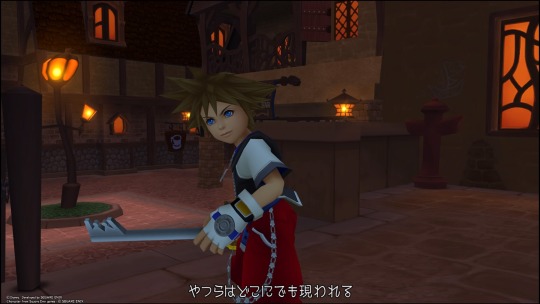
Sora:
誰だッ!?
Who’s there!?
Leon:
逃げ回ってもすぐに追いつかれる
おまえがキーブレードを持っている限りな
しかし子供とはな
Even if you run from place to place, they will catch up with you in a heartbeat. As long as you’re holding the Keyblade, that is. But to think that you’d be just a kid...
Sora:
あんたに子供扱いされたくないね
Don’t go treating me like a child.
Leon:
悪かったな
キーブレード 見せてくれないか
Well, sorry about that. How about you let me take a look at that Keyblade?
Sora:
おまえもあいつらの仲間なのか!?
Are you working with those things!?
Leon:
そうか 仕方がないようだな
Is this how it’s going to be... It’d seem I have no choice.

Yuffie:
ここで見つかるなんてラッキーじゃない レオン?
Well, aren’t you lucky to have found him here, Leon.
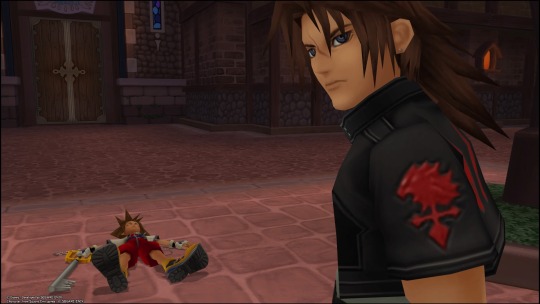
Leon:
どうかな
どうやら状況は 俺たちが 思ったより悪いらしい
I wonder about that. It’d seems the situation is worse than we expected.
Goofy:
誰もいないよ 気味が悪いね
Creepy, there’s no one here.
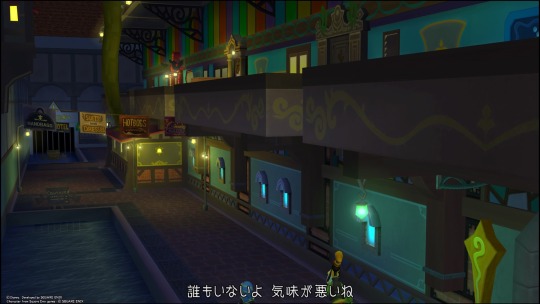
Donald:
しっかりしろ
Pull yourself together!
Aerith:
あなたたち 王様のーーーー?
Are you the king’s...?
Kairi:
もう ソラ だらしないなー
だいじょうぶ?
Oh Sora, that was sloppy of you. Are you alright?
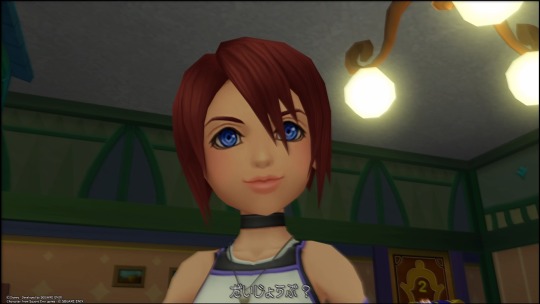
Sora:
あ うんーーーー
Ah, yeah...
Kairi:
あいつらはね 君のそのキーブレードを狙ってるの
正確にはキーブレードを持ってる君の心をね
You know, those things are after the Keyblade. Or to be more accurate, they’re after its wielder’s, your, heart.
Sora:
無事で良かった カイリーーーー
I’m glad you’re safe, Kairi.
Kairi:
誰それ? 私はーーーー かわいいユフィちゃん!
Who’s that? I am... the adorable Yuffie!
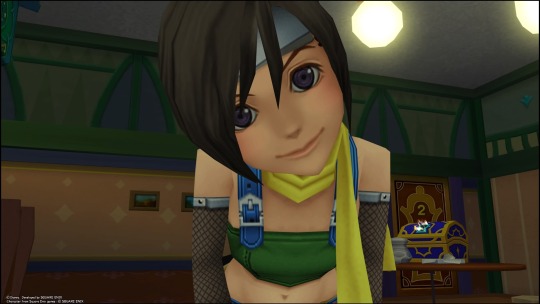
Sora:
へ?
Huh?
Yuffie:
スコールが無茶するからだよ
This is because you roughed him up so badly, Squall.
Leon:
レオンと呼べ
Call me Leon.
Sora:
キーブレードーーーー
The Keyblade...
Yuffie:
そう ちょっと手荒だったけど あいつらをまくにはーーーーー
君がキーブレード手放すかーーーー
That’s right. Sure, we had to use some extreme methods, but to throw them off our trail we needed you to either let go of your Keyblade or...
Leon:
おまえの心を隠す必要があった
ほんお一時しのぎだけどな
それにしても おまえが選ばれし者とはな
頼りないが 仕方がない か
We needed to conceal your heart, even if it’s just for a while.
But still, to think that you would be the chosen one. Not very reassuring, but I guess we can do nothing about it.

Sora:
全然わかんないって! ちゃんと説明してくれよ!
I don’t get this at all! Just spell it out for me!
Aerith:
あなたたちのお城や この街の他にも いろいろな世界があるのは 知ってるわね?
You are aware that there are other worlds besides your castle and this town, am I correct?
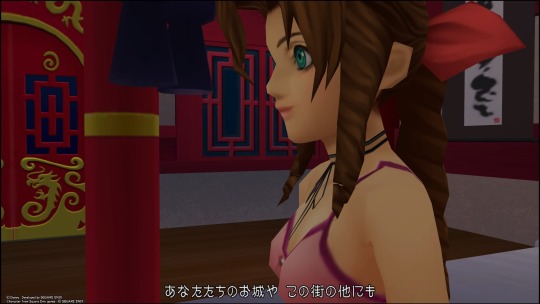
Donald:
うん
Yeah.
Goofy:
でも誰にも言っちゃいけないんだよ
But we’re not supposed to tell anyone.
Aerith:
世界がまじわること いままで無かったから
誰も知らなかった
でもハートレスが現れて 事象変わちゃったーーーー
That’s because the worlds haven’t intersected like this before. No one was aware. Then the Heartless showed up and the situation changed.
Sora:
ハートレスーーーー
The Heartless...
Yuffie:
ほら 君を追っかけたやつら
The things that were chasing after you, remember?
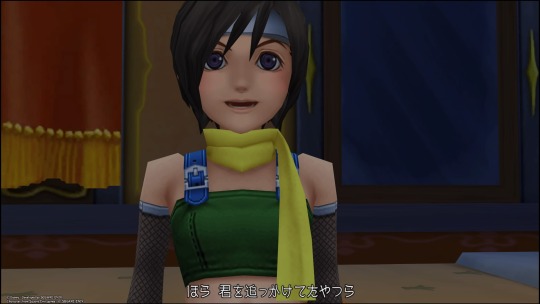
Leon:
〝心なきもの〟だ
Those without hearts.
Yuffie:
やつら 人の〝心の闇〟に反応して
襲いかかって来るんだよ!!
They react to the darkness within people’s hearts and strike!
Leon:
誰の心にも闇はある おまえも気をつけろ
There’s darkness in everyone’s hearts, you should stay vigilant as well.
Yuffie:
ねえ アンセムって人 知ってる?
Hey, do you know about this person called Ansem?
Goofy:
アンセムぅ?
Ansem?
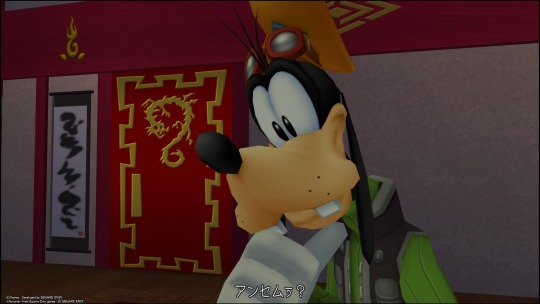
Aerith:
ハートレスの研究してた人
その人のレポートに ハートレスのこと いろいろ書いてあったの
Someone who studied the Heartless. There’s a lot of information written about them in his reports.
Goofy:
そのレポート 見せて
Show us those reports.
Aerith:
あちこちに散らばっちゃってる
They’ve been scattered all over.
Donald:
あちこち?
All over?
Aerith:
いろいろな世界
All over different worlds.
Goofy:
あ じゃあ僕らの王様はーーーー
Oh, so our king must be...
Aerith:
レポート探しに旅立った かもね
He might’ve set out to find those reports.
Goofy:
早く追いかけなくちゃ!
We need to chase after him quickly!
Donald:
そのーーーー その前に〝鍵〟!
Before that... the “Key”!
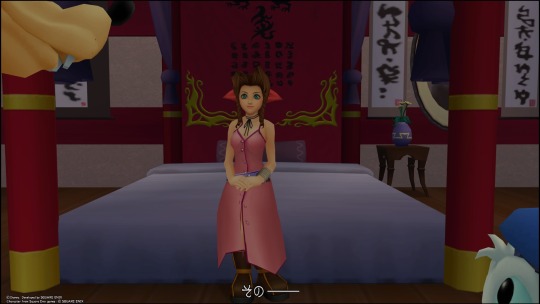
Aerith:
そう〝鍵〟キーブレード
Right the “Key”, the Keyblade.
Sora:
鍵?これが?
A key? This thing?
Yuffie:
そそっ!
That’s right!
Leon:
キーブレードはハートレスにとって 邪魔なものらしい
だから 持ち主のおまえは狙われる
It would seem the Keyblade spells trouble for the Heartless. They’re after you because you’re its wielder.
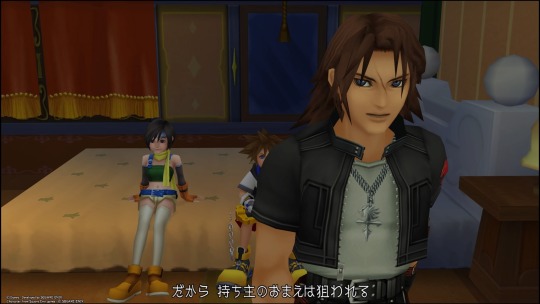
Sora:
俺 こんあの いらないって
I don’t need this thing.
Yuffie:
キーブレードが持ち主を選ぶんだってさ
あきらめなさい!
Apparently the Keyblade chooses its wielder.
Just give up!
Leon:
災難だったな
Tragic for you.
Sora:
そんなあーーーー
俺 部屋でボーッとしてたらーーーー
俺の部屋は? 家は 島は!?
リク! カイリ!!
No waay... I was just spacing out in my room and.... What happened to my room? My home, the island!? Riku! Kairi!!
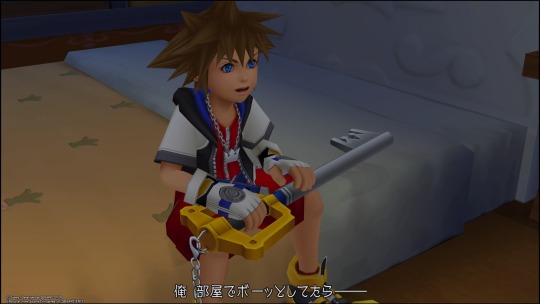
Leon:
誰にも 何とも言えないことだ
That’s something none of us have the answers to.
Leon:
ユフィ先に行け!
Yuffie, you go on ahead!
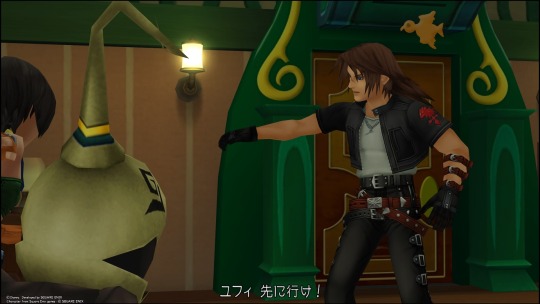
Aerith:
ユフィ!?
Yuffie!?
Leon:
ついてこい ソラ!
Sora, follow me!

Goofy:
こ この人たちがハートレス?
Are, are these the Heartless?
Donald:
ついてこい グーフィー!
Goofy, follow me!
Donald and Goofy:
鍵だァ!
The Key!

Sora:
捜してたって俺を?
You were looking for me?
Leon:
彼らはキーブレードを持つ者を 捜していたんだ
They were looking for the one carrying the Keyblade.
Goofy:
ねえ 僕らの船でいろんな世界に行ってみようよ
Hey, let’s travel to all kinds of worlds together on our ship!

Sora:
リクとカイリに会えるかなーーーー
I wonder if I’ll be able to meet Riku and Kairi...
Donald:
会えるさ!
Of course!
Goofy:
本当かい!?
Is that actually true?

Donald:
知らない でもあの子がいないと王様に会えないだろ
No clue, but we probably won’t be able to find the king without him.
Leon:
ソラ 行ってこい
ともだちを捜すなら なおさらだ
Sora, you should go. If you’re looking for your friends then that’s all the more reason to.
Sora:
そう かな
I wonder...
Donald:
でも 今のキミは 船に乗せられないな
怖い顔 さみしい顔はダメ
But we can’t let you board the ship like that.
No angry faces or sad faces allowed.
Goofy:
どうりで 僕らの顔は面白いと思った
No wonder our faces look funny.
Donald:
笑顔が船のエネルギー
Happy faces act as an energy source for the ship.
Sora:
笑顔ーーーー
Happy faces...

Goofy:
すごく面白いよ その顔
That's one hilarious face!
Sora:
行くよ 俺も 会いに行く
I’m coming with you. I’m going to find them.
Donald:
ドナルドだ
Donald.
Goofy:
僕 グーフィー
I’m Goofy.
Sora:
俺 ソラ
I’m Sora.
Goofy:
僕たちは仲間だ! We’re in this together!
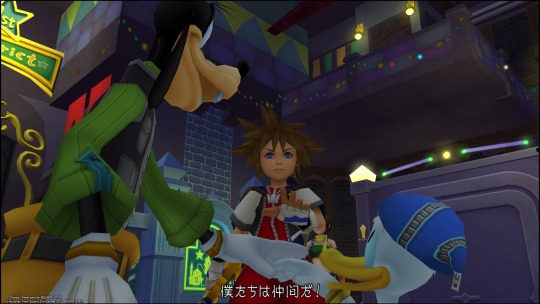
Kairi:
なんだかこういうとこってドキドキするね
〝秘密の場所〟を思い出さない?
ふたりで落書きした あの洞窟
おぼえてない?
Places like this are kind of exciting. Doesn’t this remind you of our hideout?
The two of us used to scribble in that cave. You remember?
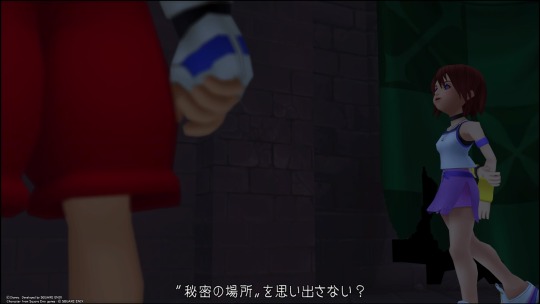
Sora:
カイリーー
Kairi...
Goofy:
ソラ?
Sora?
Riku:
どうしたんだ? だらしないな
What’s wrong? That was sloppy of you.
Sora:
リク!?
Riku!?
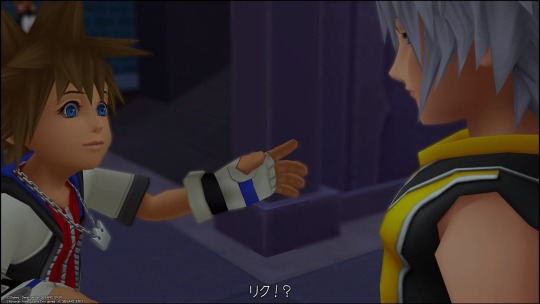
Riku:
な なんだよ?
Wha, what’s up with you?
Sora:
今度は 幻じゃない よな?
You’re not just another illusion, are you?
Riku:
何言ってんだ? やっと会えたってのに
What’re you talking about? We finally got to meet each other again.
Sora:
リク!!
Riku!!
Sora:
そうだ カイリはーーーー
Oh, right! Where’s Kairi...?
Riku:
一緒じゃないのか?
心配するなよ 俺たちで捜せばすぐに見つかる
俺たちは 外の世界に出られたんだぜ
もう どこへだって行けるんだ
カイリを見つけるなんて簡単さ
そうだろう ソラ
ぜんぶ俺にまかせろよ そうすればすぐにーーーー
Is she not with you?
Don’t worry, we’ll find her in no time at all. We managed to reach the outside world after all. We can go anywhere now.
Finding Kairi will be child’s play, isn’t that right, Sora? Just leave everything to me and soon enough...
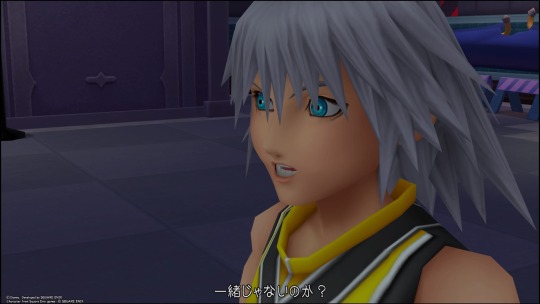
Sora:
誰にまかせろって?
Leave everything to whom?
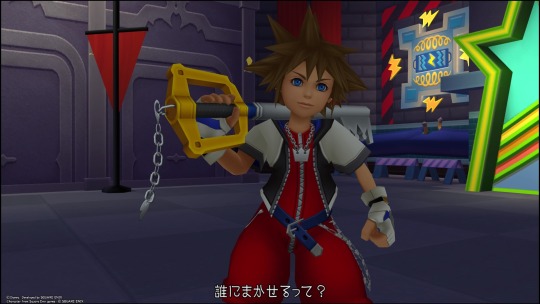
Riku:
ソラ おまえーーーー
Sora, you...
Sora:
俺だってリクとカイリを捜してたんだ このふたりといっしょに
I was also out there looking for you and Kairi. You know, together with these two.
Riku:
いっしょにーーーー
Together...
Donald:
え〜我々はーーーー
Right! We are...
Sora:
3人でいろ���ろな世界をまわってるんだ あちこち
Us three are traveling all around different worlds.
Riku:
へえ おまえが? 信じられないな
Huh, you are? That’s surprising.
Goofy:
ソラはキーブレードに選ばれた勇者なんだ
Sora’s a hero chosen by the Keyblade.
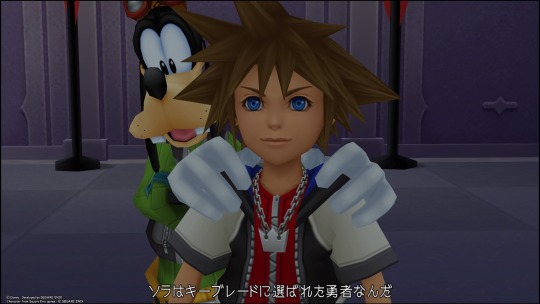
Donald:
そうは見えないけど
Even though he doesn’t look the part.
Sora:
なんだと!
What was that!?
Riku:
キーブレードって これか?
The Keyblade... this thing?
Sora:
あれ? あ! 返せって!
Huh? Ah, give it back!
Riku:
ホラ
Here you go.
Sora:
おっ
そうだリク おまえもいっしょに来いよ!
俺たち すっげえ船に乗ってるんだ
特別に 乗せてやるって
Oh right, Riku, you should come with us! We’re flying this neat ship. As an exception we’ll let you on board.
Donald:
そんな勝手に!
Don’t go deciding things like that on your own!
Sora:
いいだろ?
It’s fine, isn’t it?

Donald:
ダメ!
No!
Sora:
なんでだよ!せっかく会えたのに!
Why not? I finally got to meet him!
Donald:
だめったら だめ!
Because I said so!
Goofy:
あれ?
Huh?
Sora:
リクーーーー?
なんだよーーーー
ま いっか! リク 元気だったし
リクに会えたんだ カイリにだってきっと会えるよな!
Riku?
What’s with him... Well, it’s fine! He seemed to be doing OK.
I was able to meet Riku, so I’m sure I’ll be able to meet Kairi as well!

Maleficent:
ごらん 私が言ったとおりだろう?
おまえは 必死になって あの子を探していたけれど
あの子はちゃっかり新しい仲間を 見つけていたって訳さ
あの子はね おまえよりも 新しいともだちの方が大事なんだ
でもね 心配することはないよ
あんな子のことは忘れて 私とおいで
おまえが望むものを見つけてあげるよーーーー
Would you look at that, it is just as I told you.
You were desperately looking for him, but that sly boy found himself some new friends. You see, he cherishes them more than you. But there is no need to worry, just forget someone like him and come with me. I’ll find you what you want.
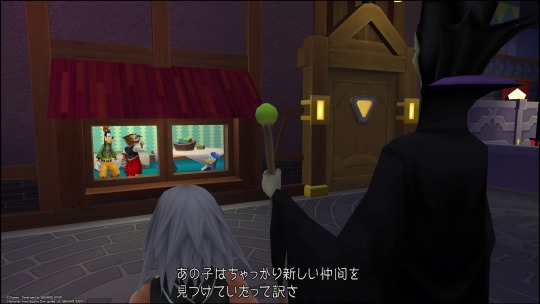
Translator’s notes:
1. Instead of “We’re in this together”, a more literal translation for the part where Sora, Donald and Goofy stand in a circle and Goofy exclaims “Bokutachi wa nakama da”, would be “We’re comrades” but I found that it’d sound odd coming from his mouth in that situation. Later Maleficent also uses the word “nakama” when she refers to Donald and Goofy as Sora’s “friends”. I find it’s more the context that gives this word a specific form in English. You wouldn’t normally use the word “nakama” for your friends. It needs to have that underlying meaning that you’re also comrades. I thought it’d be interesting to explain how this word could be translated depending on the situation.
2. Fun fact: Riku and Kairi both have the same opening lines when they talk to Sora outside of the Destiny Islands for the first time. Both of them call him out for being careless/sloppy in a fight: “Darashinai”.
For anyone who wants to actually watch the Japanese cutscenes: You can find them here on YouTube.
And if you want to check out the rest of the cutscenes I’ve translated, you can find them here.
#kingdom hearts#kingdom hearts translation#traverse town#jen translates#kh1 translations#kingdom hearts final mix
18 notes
·
View notes
Text
[Kanji/Romaji/English Lyrics] StarMyu - Miracle Catcher
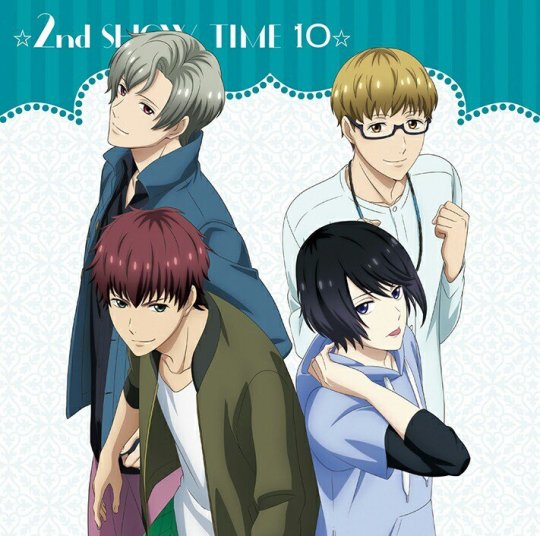
OMG!! I remember crying when I first heard this song T_T It was also a very important turning point for all three of them so I have like, a lot of emotions whenever I listen to this orz
※ Please don’t re-post the kanji/romaji and English translations without permission. Instead of reposting, please just like/reblog instead ^^
Full lyrics under the cut, enjoy~!
[Miracle Catcher]
KANJI:
叶えたいなら踏み出せばいい
その一歩だけで 何かが変わるはず
嬉しいのに 立ち止まってるのは
目の前の眩しさが なぜだか苦しくて
俺たちの遊びは 永遠につづいてく
カタチを変えまたたく星のように
君だからできること
君しかできない笑顔
追いかけて 触れたくて
憧れに肩を並べ
響き渡れ 願い込めて
その先を歌うために
ひとりではないのさ
僕たちは 夢にいる
たったひとつの たったひとりの
君になればいい 追いかけてみればいい
諦める方法なんて知らない
挫けても何度でも 笑って進みたい
あの頃の俺たち 身勝手な自由さえ
答探すためのリハーサル
君らしく胸を張れ
未来で待っているから
なりたくて 頑張って
憧れにただ無邪気で
出来なくって 悔しくって
踊り続けていたくて
今日の幕が下りても
僕たちは 夢にいる
そして両手をひろげて
ぜんぶ つかみ取ればいい
ほら 世界を奇跡ごとキャッチしたら
きっと叶うだろう
君だからできること
君しかできない だから!
輝きで追いかけて
憧れに肩を並べ
響き渡れ 願い込めて
その先を歌うために
ひとりではないのさ
僕たちは 夢にいる
ROMAJI:
kanaetai nara fumidaseba ii
sono ippo dake de nani ka ga kawaru hazu
ureshii no ni tachidomatteru no wa
me no mae no mabushisa ga naze daka kurushikute
oretachi no asobi wa eien ni tsuduiteku
katachi wo kae matataku hoshi no you ni
kimi dakara dekiru koto
kimi shika dekinai egao
oikakete furetakute
akogare ni kata wo narabe
hibiki watare negai komete
sono saki wo utau tame ni
hitori de wa nai no sa
bokutachi wa yume ni iru
tatta hitotsu no tatta hitori no
kimi nareba ii oikakete mireba ii
akirameru houhou nante shiranai
kuchikete mo nando demo waratte susumitai
ano koro no oretachi mi kate na jiyuu sae
kotae sagasu tame no rihaasaru
kimi rashiku mune wo hare
mirai de matteiru kara
naritakute ganbatte
akogare ni tada mujaki de
dekinakute kuyashikute
odori tsuzuke itakute
kyou no maku ga orite mo
bokutachi wa yume ni iru
soshite ryoute wo hirogete
zenbu tsukamitoreba ii
hora sekai wo kiseki goto kyacchi shitara
kitto kanau darou
kimi dakara dekiru koto
kimi shika dekinai dakara!
kagayaki de oikakete
akogare ni kata wo narabe
hibiki wataru negai komete
sono saki wo utau tame ni
hitori de wa nai no sa
bokutachi wa yume ni iru
ENGLISH:
HIRAGI: If you want to make it happen, simply step forward.
HIRAGI: That one small step might change something.
YUUTA: I am happy but, there’s something that’s stopping me.
YUUTA: The light in front of me is so bright that it feels a little painful.
OTORI: Our playtime will continue forever.
OTORI: Just like a star that continues to shine even after changing.
HI/OTO: It’s because it’s you that you can do it.
HI/OTO: A smile that only you can make.
YUUTA: I keep chasing, I want to touch it.
HI/OTO: Wanting to stand next to the person I admire.
YUUTA: Let’s gather our wishes and make them resonate.
ALL: For us to be able to sing from here on out.
ALL: You are not alone.
ALL: We will be in your dreams.
HIRAGI: My most important, my one and only.
HIRAGI: You should just be yourself and show me that you can catch up.
YUUTA: I don’t know a way to give up.
YUUTA: Even if I fail, I’ll always keep smiling and continue.
OTORI: As long as we have that desire from long ago,
OTORI: we will continue on to a rehearsal to search for our answers.
HI/OTO: Stand proudly just like you always do.
HI/OTO: A future is waiting for you.
YUUTA: I want to be like you so I do my best.
HI/OTO: Simple admiration is fruitless.
YUUTA: Even if I feel grief whenever I fail,
ALL: I still want to continue dancing.
ALL: Even if today’s curtains fall down,
ALL: we will still have our dreams.
OTORI: And if you hold out both your hands,
HIRAGI: you’ll be able to grasp everything.
YUUTA: Look, if you catch the world’s miracles,
ALL: I’m sure that they will all come true.
HIRAGI: It’s because it’s you that you can do it.
HIRAGI: Only you can do it!
ALL: Chasing you brilliantly,
ALL: I’ll be able to stand near the person I admire.
ALL: Let’s gather our wishes and make them resonate.
ALL: For us to be able to sing from here on out.
ALL: We are not alone.
ALL: We have our dreams with us.
※ Please don’t re-post the kanji/romaji and English translations without permission. Instead of reposting, please just like/reblog instead ^^
If you like this, please consider buying me a ko-fi here to support my work. (o^▽^o)Thank you!!
#starmyu#high school star musical#starmyu translations#my translations#lyrics translation#i cry every time i listen to this T_T#it just#it speaks so much to me on a personal level
24 notes
·
View notes
Note
Do you not feel there's a few quotes from that exhibition that seem to be about Zack? Her saying her feelings don't change, the sky takes away those she loves. Even when she is saying that she keeps seeing that person with the same eyes but won't ask (cloud I assume) about them? Then says she "can't stop thinking about you". Makes it seem like she is thinking of her feelings for Zack? I'm hoping not but I'm just worried it could be.
Anon is referring to this, y’all.
I think ONE is, others aren’t. I also read what Japanese fans thought of these quotes, and they interpreted these quotes as Aerith being afraid of moving on because she’s afraid she’ll be left behind again. Other’s interpreted some of theme to be like Aerith doesn’t think she deserves to move on and be happy. Keep in mind, there’s no date on what time during the compilation Aerith thinks any of this.
“Sometimes I see someone who has the same eyes. Same as you, I mean. And I wonder, should I ask: Do you know him? Do you know where he is? But I never do.”
「時々、同じ目の人を見かけるよ 君と同じ目 そのたびに、迷うんだ あの人、知ってますか? どこにいるか知りませんか? 訊いてみようか、やめようか……って」
Clearly about Zack and her seeing other soldiers/people with blue eyes. Which shouldn’t surprise anyone. I mean, Zack up and left Aerith (was even going to see other women instead of her), Aerith didn’t get closure at all, this kind of behavior is normal, especially for a young teenage girl that never had any friends or a “crush” before. That doesn’t mean she’s continued to love him when she’s clearly expressed how she has moved on. Another thing is, we don’t know when Aerith says this quote. It could be a week after Zack went missing, or a year. We just don’t know so it’s relevancy isn’t much.
“I hate the sky. It carries away everyone I love.”
「空、嫌いだな 大切な人、連れてっちゃうから」
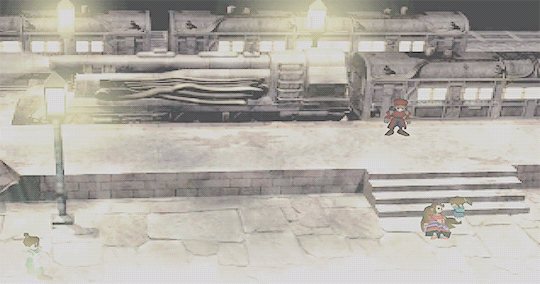
[x]
This quote is about Aerith’s mother, NOT Zack. The “sky taking away” people is just how people die in FFVII (Zack, Kadaj, Angeal, etc). As the original game AND the Ultimanias state, Aerith did not know Zack died. She cannot be referring to Zack because she didn’t know he died. However, Aerith was there when her mother died and she would have “seen” the sky “taking” her. On top of this, Crisis Core said Aerith was afraid of the sky because she felt like it could take her away.
エアリス:空なんて、なくていい。
ザックス:年中プレートに覆われてたら 空が恋しくなるだろ? 普通。
エアリス:ごめん、普通じゃないの。
ザックス:……わけあり?
エアリス:空、恐いんだ。 吸い込まれそうで……
エアリス:変、だよね。
This was also hard for Japanese fans to understand or come to a conclusion on, but I feel like it is entirely about Aerith sensing her tragic future as well as about her mother.
“This is a strange place. Flowers bloom all year long. The seasons never change— My feelings never change— I’m stuck.”
「ここ、不思議な場所なの 1年中、お花、咲くんだ だから、季節が巡らなくて——だがら、気持ちが変わらなくて—— 困っちゃうな」

Not👏about👏Zack👏
People are just interpreting it that way. I instinctively thought this was about her Cetra heritage and her “sensing” her destiny/sacrifice. 気持ち isn’t just for romantic feeling, it’s for a wide range of feelings. And the last part convinces me that it’s about her anxiety and reluctance to accept her Cetra destiny. So from what I’m reading, it’s about her knowing that something bad is going to happen in the future, hence the “困っちゃうな“.
And my theory is proven by this next quote:
“Things won’t last forever. Sure, it’s lonely. It’s sad. But I can say "bye” with a smile. Right”
「この道も、いつか終わるよ 寂しいけど、悲しいけど またねって笑顔で言おう? ね?」
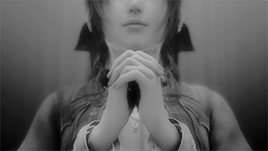
If people are going to say that means anything BUT Aerith knowing/accepting her sacrificial destiny, then they need to replay the game.
“You came. Thank you. I’m glad. But, you’re already—”
「来てくれたんだ ありがとう うれしいよ でも、君はもう……」
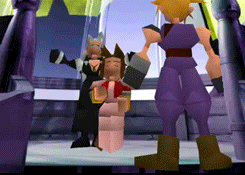
Clearly this is from Aerith’s death scene, which is why Aerith’s saying she’s happy Cloud came for her but that he was “already too late” (logically what she was going to say) and her sacrifice was completed.
“That’s it. I give up. I can’t stop thinking about you. Ugh, I can’t stand this!”
「参りました 降参です 君のこと、気になって…… ああ悔しい!」
I think this is about Aerith accepting that she’s fallen for Cloud. She’s frustrated with herself because she’s worried that she’s just going to get hurt again.
Hence:
“Stamp! Stamp?! Oh… Guess you’re gone, too.”
「スタンプ!スタンプ!? ……そっか 君もいなくなっちゃうんだ」
While this confused Japanese people, too—I believe this is about when Aerith hears Cloud sneaking out of her house in the middle of the night. The “stamp” sound is the floorboards creaking (Japanese people were utterly perplexed by this word). This quote clearly displays how Aerith is afraid of being left behind by another man. Think something along the lines of:

“You’re so far now. I’m so far from you. Oh… I’m rising. The sky is carrying me away. I can see you. You’re crying. Don’t cry. You’ll make it rain.”
「君が離れていく 君から離れていく ああ……昇っていく わたしも空に消えるんだ…… 君が見えるよ…… 君が泣いている…… もう、泣かないで 雨になっちゃうよ」
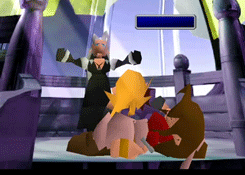
This is NOT about Zack. I saw a youtube video present it like it was but it isn’t. This is PURELY about Cloud and Aerith being separated and how Cloud was so heartbroken by her death his tears were falling so much that it was as if it was raining.
The entire exhibit was solely focused on Cloud’s love and heartbreak over losing Aerith and how Aerith was a major influence in Cloud’s life. Clerith quotes were used to advertise the event, Cloud and Aerith’s separation was given a special miniature calendar picture, all of the descriptions are about Cloud and Aerith’s relationship.
If people honestly think for a single second that Square Enix did all of ^this^ just to throw in “z/erith” quotes, then there’s no helping them out of that rabbit hole.
So, hon. Don’t worry for a second about Z/erith. That ship has been nuked since 1997.
#ff30th#clerith#antizerith#ff7r: ltd#ff7: aerith#clerith exhibition#cloud strife#aerith#ff7#クラエア#クラウド x エアリス#クラウド・ストライフ#クラウド#final fantasy vii#final fantasy 7#ffvii#aeris#aeris gainsborough#aerith gainsborough#cleris#clourith#cloud x aeris#cloud x aerith#cloudxaerith#cloudxaeris
57 notes
·
View notes
Link
Difference Between Male and Female Japanese Speech ("How-to avoid sounding too girly or boyish in Japanese?")
PREFACE:
"How do I avoid sounding too girly/boyish when speaking Japanese?" is one of the most common questions we get; and to be completely honest, it is usually asked by learners of the Japanese language who are at a fairly beginner level. Our guess is that most people asking this question have started learning Japanese by somewhat unconventional means (e.g. befriending a native Japanese speaker and starting to learn from them as opposed to beginning from a textbook). In these cases, probably the best general response to this concern is:
Inadvertently sounding too masculine or feminine in Japanese isn't a big deal at all, so there's no need to fret over it.
One, because native Japanese speakers-and even non-native Japanese speakers will surely understand if you don't have a mastery of gender-based speech when just starting out. You can stick to gender-neutral speech instead of having to worry about mastering female and male speech too when you already have so much vocabulary, grammar, kanji, etc. on your plate to learn.
Two, because a fully fleshed out answer to the question "How do I avoid sounding too girly/boyish when speaking Japanese?" involves referring to a lot of Japanese language topics, including some that are relatively intermediate level and thereby some that you might have trouble following if you're still fairly new to the language.
Nonetheless, we are still indeed going to go into said fully fleshed out answer in this lesson below; and having said that, now is perhaps the best time to provide a list of prerequisite lessons before we begin.
Prerequisite(s):
First Person Pronouns, or, Ways to Say “I” in Japanese (Post | Video)
Second-Person Pronouns, or, Ways to Say “You” in Japanese (Post | Video)
ね and よ as Final Particles (Post | Video)
Conjugations of Desu (です) (Post | Video)
Introduction to Adjectives (い-Adjectives and な-Adjectives) (Post | Video)
Conjugating い-Adjectives (Post | Video)
Conjugating な-Adjectives (Post | Video)
Japanese Word Beautifiers お and ご (Post | Video)
Prerequisite(s):
*specifically for the examples incidentally provided below, not necessarily required to understand the key concepts of this lesson
Desiderative たい-Form (Pre-ます-Form VERB + たい as “want to VERB”) (Post | Video)
Negative ない Form (Verb Conjugation) (Post | Video)
In many languages across the world, there is a clear distinction between masculinity and femininity.
For example, the Spanish language assigns a "grammatical" gender to every single noun word, even nouns words that represent inanimate objects with no physical gender.
The Japanese language employs a difference based upon gender in a much lighter sense, in that male speakers and female speakers tend to speak in a slightly different way in certain points in their speech; but even if a male speaker chooses (inadvertently or not) to sound like-or come off as, a female speaker with more feminine speech (or vice-versa) their language will still be one-hundred percent grammatically correct.
In this sense, gender-based Japanese speech is quite stylistic, which is to say it only appears in casual Japanese speech. Due to this, beginner-level learners of the Japanese language are likely not to come across this topic if their curriculum is textbook-heavy, as textbooks use formal and written language, which is both considered the more standardized Japanese and essentially gender-neutral.
All in all, the differences between male and female speech in the Japanese language are not prominently observable until first, what is being observed is an actual conversation and not just textbook content; and two, the participants of said conversation have transitioned from polite speech to casual speech and have become comfortable enough with their addressees to convey their personality more by speaking in a more masculine or feminine manner.
We separate the differences between male and female Japanese speech into three categories, in order of most distinguishing of gender:
Usage of Pronouns (First and Second Person)
Sentence Enders (Particles)
Select Vocabulary and Phrases
We also make a general distinction between male and female Japanese speech that these categories will follow:
Female-to-male speech can also be interpreted (perhaps more reliably so, in terms of a mnemonic device) as polite-to-rough speech. As unfair as it may seem, female speech in Japan is often associated with being more polite, reserved, and respectful, while male speech is considered more forward, rough, and crude.
#01. Usage of Pronouns (First and Second Person)
youtube
Female:
あたし (atashi) - First-person pronoun derived from the gender neutral 私 (watashi), considered more cute
*The use of one's own name to address oneself (i.e. referring to oneself in the third person) is also considered more habitually done by female speakers, as it can come off as cute.
Male:
僕 (boku) - The most commonly used first person for male speakers
俺 (ore) - Considered even more masculine than 僕 (boku) and more present in especially casual conversations amongst male friends as opposed to formal situations
*Female speakers may be heard using both male pronouns above for whatever reason.
Second Person Pronouns:
While first person pronouns are more indicative of one's self identity, second person pronouns are more dependent on the addressee of the speaker and what relationship the speaker has with them. As such, second person pronouns can vary heavily even when focusing on the topic of gender. Refer to Second-Person Pronouns, or, Ways to Say “You” in Japanese (Post | Video) for more information.
#02. Sentence Enders (Particles)
youtube
Female:
Using わ (wa) in place of よ (yo) - Naturally has a softer sound. わよ (wayo) is also a possibility.
*One of the female points of speech representative of an older female generation and may become rare when transitioning from fictional Japanese media (anime, movies, drama, etc.) to real life conversation
*This should also not to be confused with the common Kansai dialect usage of わ (wa), which is not female-specific
Sentence-ending particle の (no) used for statements - While the sentence-ending particle の (no) is commonly used by both genders when asking questions, it is more habitually used by female speakers when making statements. のよ (noyo) is also a possibility.
Using かしら (kashira) in place of かな (kana) - Expresses more wonderment, more feminine
*One of the female points of speech representative of an older female generation and may become rare when transitioning from fictional Japanese media (anime, movies, drama, etc.) to real life conversation
Example(s):
これが本当かしら Kore ga hontou kashira "Could this be true?"
Male:
だ (da) - The copula with loads of grammatical context. When viewed specifically through the lens of female-male speech, だ (da) is considered to add masculinity to speech because it is emphatic and declarative. So, while in a lot of cases the presence of だ (da) is grammatically required, it can be construed as masculine when it is used in a case wherein it is optional (e.g. after a NOUN or な-Adjective word). Since だ (da) has such an integral grammatical function that transcends gender-based speech and thereby female speakers are naturally bound to use this effect as well, there are select cases wherein male speakers will use an emphatic and declarative だ (da) to avoid sounding too feminine (e.g. before the sentence-ending particles ね, な and よ).
Example(s):
素敵だね Suteki da ne "Isn't It Wonderful?" [masculine]
素敵ね Suteki ne "Isn't It Wonderful?" [feminine]
*Of course, let's take note here that the Final Fantasy X video game ballad entitled 素敵だね does in fact exist and is quite probably written from the prospective of a female character to remind us this isn't a one-hundred percent reliable indicator of gender.
素晴らしいね Subarashii ne "Wonderful, huh?" [gender neutral] *Considered gender-neutral because it is grammatically incorrect to include the copula だ (da) after an い-Adjective at all, so there's no way to deem this sentence as either more feminine or masculine.
Changing the あい sounds into えぇ - Most commonly done for the Negative-ない Form of words and い-Adjectives, e.g. のまない (nomanai) into のまねぇ (nomanee) and たかい (takai) into たけぇ (takee) into "do not drink" and "tall" respectively (notice how the definition does not change whatsoever).
*May branch out to other adjective words with slightly different sound endings as well, e.g. すごい (sugoi) into すげぇ (sugee).
Adding い to the end of certain sentence-ending particles - Most apparently done with the sentence-ending particle for marking questions, か (ka), and the copula だ (da), to form かい and だい respectively. Meaning does not change.
Example(s):
いいかい! Ii kai! "Listen, you!"
そうかい! Sou kai! "Is that so!"
一緒に行くかい? Issho ni ikukai? "Shall we go together?"
調子はどうだい? Choushi wa doudai? "How are you?"
Sentence-ending particles ぞ and ぜ - Considered very masculine, commonly used in imperative statements. While heavily used in fictional Japanese media (anime, movies, drama, etc.) to emphasize boyish and masculine characters, also considerably present in real life conversations.
*ぜ is considered to be used more by children as opposed to adults-and further, is said to have greatly dwindled in usage in real life conversation.
Example(s):
やっぱ あ��た すげぇぜ。 Yappa anta sugee ze. "You really are amazing."
修業の成果だぜ! Shuugyou no seika da ze! "This is the fruits of my training!"
わくわくしてきたぞー! Waku waku shite kita zo-! "I'm getting more and more fired up!"
一緒に帰るぞー! Issho ni kaeru zo-! "Let's head back together!"
Changing the sentence-ending particle ね to な - The affirmation seeking sentence-ending particle ね is changed to な, invoking a rougher sound. The multi-faceted ね here, while commonly considered to express seeking affirmation to your statement, changes more into affirming your own statement or desire as な. The same tone of kind of throwing a thought out into the air is still present.
Example(s):
いいな Ii na "That sure sounds nice (I'm envious)!"
旅行したいな Ryokou shitai na "I sure would love to go on a trip."
#03. Select Vocabulary and Phrases
Beautifiers
Phrases
Words
Beautifiers:
Female speakers are considered to much more habitually use what are called word beautifiers (美化語), which entails adding the character お (o) or ご (go) before certain noun words in order to express a politeness.
Example(s):
お買い物 ('okaimono/shopping')
お花 ('ohana/flower')
お部屋 ('oheya/room')
お友達 ('otomodachi/friends')
お料理 ('oryouri/cooking')
*Note that you cannot simply do this for any given noun word, there are select ones in which this can apply. Also, you can not freely choose between using お (o) or ご (go); depending on the noun word being "beautified," you must use the appropriate character.
*Also note again that this method is not completely restricted to female speakers. Male speakers may apply this method when in formal situations, it is just that female speakers are more inclined to even in everyday conversations.
Phrases:
Some phrases that exist purely in the realm of spoken Japanese (utterances similar to "um," "like," "well," etc. in the English language) are also considered gender-indicative.
Example(s):
あら - "Oh my" [feminine]
Words:
Perhaps as it is with any other language, some words in the Japanese language have multiple versions-or rather, synonyms that are considered either more polite or impolite. In line with the aforementioned construct of Japanese female speech being focused upon politeness, female speakers are much more inclined to use the polite synonyms of words.
*This may apply even when said female speakers are speaking amongst close friends and family.
Example(s):
"rice, food" - 飯 ('meshi') [masculine] | ご飯 ('gohan') [feminine] "to eat" - 食う ('kuu') [masculine] | 食べる ('taberu') [feminine] "stomach, belly" - 腹 ('hara') [masculine] | お腹 ('onaka') [feminine] *common in the expressions はらへった [masculine] and おなかすいた [common, feminine] to express "I'm hungry" "butt, ass, hips" - けつ ('ketsu') [masculine] | お尻 ('oshiri') [feminine]
Example Sentence(s):
"I don't want to eat sushi."
僕寿司食いたくねぇよ Boku sushi kuitakuneeyo. "I don't want to eat sushi." [masculine]
あたしお寿司食べたくないわ Atashi osushi tabetakunaiwa. "I don't want to eat sushi." [feminine]
✧¸¸.•*¨*• •*¨*•.¸¸✧
Learning Japanese is a YouTube video series with the sole purpose of providing Japanese lessons online for free for anyone at any level! Find 300+ videos of various topics including grammar, vocabulary, kanji, culture, anime, and more with the link below! https://www.youtube.com/user/learnjapanesebod
Join fellow learners of Japanese on our Discord server community! You can follow the series on Facebook | Twitter for updates as well!
Support Learning Japanese on Patreon! Please consider becoming a patron to support the continuation of this video series and the development of our curriculum! https://www.patreon.com/learningjapanese
This video series is presented by becauseofdreams http://becauseofdreams.com/
#learn japanese#japanese#learning japanese#how to speak japanese#japanese lessons#japanese language#jp#nihongo#japanese vocabulary#text#LONG POST#gender#female#male#masculine#feminine#speech
1K notes
·
View notes
Text
Chrom / Maribelle Supports - Localization vs. the Original Japanese
FE Game Script Translations - FE Novel Translations - Original FE Support Conversations - Ko-fi
In this post series, I’m analyzing all of Chrom’s supports to see if he was any different in the localization!
———————————
C Support
Interestingly, despite “drop formalities, we are good allies” being a trope that comes up constantly in both Japanese and English in Fire Emblem, at the beginning of the support, it’s only in the English that has Chrom asks Maribelle to just call him “Chrom.”
Japanese:
[マリアベル] (Maribelle)
あら、クロムさん。▼ (Oh, Chrom-san!)
[クロム] (Chrom)
マリアベルか?▼ (Is that you, Maribelle?)
Localization:
Maribelle:
Oh! Good day, milord.
Chrom:
Hello, Maribelle. ...And just Chrom is fine, please.
In the Japanese, Maribelle didn’t say anything about how much harder things must be for Chrom. Instead, she notes how considerate he always is, and is thankful for his kindness.
Japanese:
[マリアベル] (Maribelle)
あぁ…クロムさん。▼ (I will... Chrom-san.)
あなたはどんな時にも周囲の者への (No matter what, you never)
気配りをお忘れにならないのですね。▼ (forget to be considerate of those around you.)
このご厚意、ありがたく頂戴しますわ。▼ (I gratefully accept your kindness.)
[クロム] (Chrom)
いや、そんな、感激されるほどの (No, it’s not something)
ことは言ってないが…▼ (you have to thank me for, but...)
まぁ…とにかくお前も休め。▼(Well... anyway, you should rest, too.)
Localization:
Maribelle:
Well... I confess I sometimes find myself wishing for a respite. But then I remind myself how much harder it must be for you! Heavy lies the crown and all that, yes? So it's my duty to help you however I can!
Chrom:
Your dedication is appreciated, Maribelle. ...A little extreme, maybe, but appreciated. Just promise to look after yourself as well. Will you do that? ...For me?
And in this last exchange is a very slight change. Maribelle doesn’t say she enjoys her time together with Chrom, she only asks him to come talk to her again when he has time.
Japanese:
[マリアベル] (Maribelle)
クロムさん…またお時間がおありの時には (Chrom-san... please come talk to me again) ぜひお話をさせてくださいませ。▼ (when you have the time to do so.)
[クロム] (Chrom)
ああ、もちろんだ。▼ (Yeah, of course.)
Localization:
Maribelle: I so very much enjoy our time together... I pray we find opportunity to do it again. Chrom: I hope so, too...
B Support
The support starts out pretty much the same in both the Japanese and localization. Maribelle’s language just seems a touch more creative in the English, but not by much in this case!
Japanese:
[マリアベル] (Maribelle)
ええと、これは…その、(Umm. This is.... Uh,)
リズに近づく男どものリストですわ。▼ (a list of the men who have come close to Lissa.)
リズの魅力に惑わされた男どもを (It contains a plan)
把握しておいて、近づかせないように▼(to catch the men who are bewitched by her charms)
策を巡らせるための (so that they can’t get close to her.)
重大な機密書類ですのよ。▼ (It’s a very important, classified document.)
[クロム] (Chrom)
お、お前…!(Y-You...!)
そんなことしてたのか…?▼ (made something like that...?)
[マリアベル] (Maribelle)
ええ、当然ですわ。▼ (Yes, of course!)
リズはクロムさんの妹君にして、(She is your younger sister,)
イーリス聖王国の第二王女。▼ (and the second princess of the Halidom of Ylisse.)
そしてわたくしの親友ですもの。(and I am her close friend.)
何人たりとも近づけさせはしませんわ。▼(I won’t let many people get near her!)
Localization:
Maribelle:
I've been keeping track of men who may be getting too close to Lissa! My darling is a bewitching vixen, even if she doesn't realize the power of her charms. So when these lecherous men get too close, I drive them back from the ramparts!
Chrom:
...You aren't joking, are you. Why on earth would you do such a thing?!
Maribelle:
Isn't it obvious? Lissa is your younger sister, and the princess to the royal house of Ylisse! It falls upon me, her bosom friend and true companion, to save her from scallywags!
But then things deviate a little bit in the second half. The localization took out the fact that Chrom specifically asked if he’s safe from Maribelle’s scrutiny, and he actually asks to see the list. But it all ends the same, with Maribelle saying that she interviews all the men to see if they are worthy of Lissa’s presence, and Chrom asks her to keep taking care of his little sister.
Japanese:
[クロム] (Chrom)
…でも、俺もリズと一緒にいることは (...But I’m with Lissa a lot, too.)
多いが、それはいいのか?▼ (Is that okay?)
[マリアベル] (Maribelle)
もちろんですわ。▼ (Of course.) クロムさんはリズの兄上ですし、(You are Lissa’s older brother,) 真に高貴なお方ですもの。▼(and of the highest nobility.)
[クロム] (Chrom)
そ、そんなことはないと思うが…▼ (I don’t think I’m that proper, but...) まぁ、俺は (Well, it doesn’t look like) 叱られることがなさそうで安心したよ。▼(you’re going to scold me, so I feel at ease.) できればそのリストの奴らも (If it’s okay with you,) 許してやってほしいがな。▼ (I want you to show me the list.) どうせただリズと仲良く (This is just all the men who) 話をしてるだけだろう?▼ (chat with her isn’t it?)
[マリアベル] (Maribelle)
いえ、いくら同じ軍に所属する仲間とはいえ、(I mustn’t let even let our allies in the same army) そう安々とリズには近づかせませんわ。▼ (come up to Lissa so calmly!) そうですわね…▼ (I cannot...!) まずはわたくしとの面談を (First, they must interview with me) 数回踏まえてなら、▼ (multiple times, then based on those interviews,) 考えなくもありませんが。▼ (I will consider it.)
[クロム] (Chrom)
ははっ、マリアベルは相変わらずだな。▼ (Ha ha, you’re the same as ever, Maribelle.) でも、お前がそばにいてくれれば (But, if you’re by her side,) リズも安心だ。これからもよろしく頼む。▼ (then she’s safe. Please continue taking care of her.)
[マリアベル] (Maribelle)
はいっ! お任せください!(Yes! You can count on me!) 必ずクロムさんのお役に立ってみせますわ!▼ (I’ll will absolutely do my best to help you!)
Localization:
Chrom:
...Scallywags? Er, look, Maribelle. I think my sister can guard her own ramparts just fine.
Maribelle:
Ha! Don't be so naive! It seems even great men are blind when it comes to matters of the heart!
Chrom:
Hey! I am NOT blind! ...And you're being paranoid! There's no harm in Lissa having a few friends among her comrades-in-arms.
Maribelle:
That they are comrades makes them more dangerous! Snakes in the den, says I! As such, I've put a strict screening process in place. Any man who would speak to Lissa must first be interviewed by me. Many times. AND provide supporting documentation, of course!
Chrom:
...Heh. I guess in a way it's reassuring to know that Lissa has you watching over her. Well then, I'll trust you to keep her safe for me.
Maribelle:
Of course, milord! A woman of my position would offer no less!
A Support
In the Japanese, Chrom says that Maribelle shouldn’t push herself to care for him just because he’s royalty, a few extra words that the localization left out.
Japanese:
[クロム] (Chrom)
ああ…いつも気遣いありがとう。▼ (Yeah... Thank you for always looking out for me.) でも…俺が王族だからって、(But... you aren’t pushing yourself too much) あんまり無理をすることはないんだぞ?▼ (because I’m royalty, right?)
Localization:
Chrom: Of course. Thank you, Maribelle. But you really need to stop exhausting yourself on my behalf. I don't deserve it.
The second line of this dialogue was totally added in the English, though it was implied in the Japanese.
Japanese:
[クロム] (Chrom)
マリアベルが俺やリズを大切�� (Just as you think) 思ってくれているように、▼ (of Lissa and me, as very important,) 俺たちにとっても、(you are also) お前は大切な存在なんだからな。▼ (important to us.)
English:
Chrom: Just as you care for me and Lissa, so do we care about you. We would never forgive ourselves if you came to harm for our sake.
And while the meaning is essentially the same in both versions, the English chose to use some common English sayings here instead of a more direct translation.
Japanese:
[クロム] (Chrom)
ああ、一人で無理をすることはないんだ。(Good, we shouldn’t force ourselves to do the impossible all alone.) 一緒に協力しながら歩んでいこう!▼ (Let’s walk onwards as we cooperate together!)
Localization:
Chrom: We must stand shoulder to shoulder. Divided we fall, but together we rise!
S Support
This support is largely the same, but it has a lot of little differences, so strap in and get ready for this post to suddenly get a whole lot longer.
As is common in the Japanese, Maribelle’s tea elderberry tea and gooseberry jam crumpets were not given a specific type or flavor, she just said the generic “tea” and “sweets.”
Japanese:
[マリアベル] (Maribelle)
クロムさん!▼ (Chrom-san!)
お茶とお菓子をお持ちしましたわ!(I brought tea and sweets!)
甘い物を食べると疲れが取れますわよ?▼(Surely eating something sweet will ease your exhaustion?)
[クロム] (Chrom)
マリアベル、ありがとう。(Maribelle, thank you.) せっかくだから、いただくとしようか。▼ (Since you went through the trouble, I’ll have one.) あ! …これは俺が子供の頃から (Hey! ...This is the sweet) 好きなお菓子だよな!?▼ (I liked as a child, isn’t it!?) …どうして知っていたんだ?▼ (...How did you know?)
[マリアベル] (Maribelle)
リズに教えてもらいましたの。▼ (Lissa told me.)
[クロム] (Chrom)
そうか、あいつなら確かに知ってるはずだ。▼ (Oh yeah, she would know for sure.)
Localization:
Maribelle: Milord! I've brewed elderberry tea and buttered some crumpets. Won't you rest a spell?
Chrom: Well, since you've gone to all this trouble... Wait. Is this gooseberry jam? It was my favorite as a child! How did you know?
Maribelle: A little bird told me... Chrom: A little bird named Lissa, I wager. Heh heh, that girl...
In the Japanese, Maribelle also says she can’t compare to Lissa, but the sentence before that gives slightly different reasoning from the localization.
Japanese:
[マリアベル] (Maribelle)
さすがリズですわ…最愛の兄のことは (Of course Lissa... would know her)
ちゃんと把握されています…▼ (beloved brother that well.)
わたくしなんて敵うはずもない…▼ (I couldn’t compare...)
Localization:
Maribelle: Oh, how I envy your sister... You have such affection for her... And you have spent a lifetime together... How can I ever compare?
Chrom doesn’t say anything about Maribelle being his friend in this line in the Japanese here. He just wonders why Maribelle is comparing herself in such a way to his sister.
Japanese:
[クロム] (Chrom)
マリアベル、なにを言っているんだ?(Maribelle, what are you saying?) あいつは妹だぞ?▼ (She’s my sister.)
Localization:
Chrom: Maribelle, what are you talking about? Lissa's my sister. You're my...friend.
Maribelle doesn’t put herself down and say she is dreary and plain at all in this line of the Japanese.
Japanese:
[マリアベル] (Maribelle)
でも…あの…その。▼ (But... um... uh...) クロムさんの近くには、(Around you,) リズやリズのお友達を始めとして、▼ (there’s Lissa and her friends...) 貴族の女性方がたくさんいて… (and may court women...) クロムさんと親しくされていましたわ…▼ (They are all so close to you...)
Localization:
Maribelle: Yes, but you are also royalty and... And you're surrounded by all these fine and noble women! All the time! Lissa and her friends...the court ladies... Oh, you must have such wonderful times! I feel so dreary and plain by compare.
Chrom doesn’t say anything at all about royal court in the Japanese, but comments that women surround him simply because he is royalty and they are being polite.
Japanese:
[クロム] (Chrom)
ん…? まぁ俺も一応王族だからな。(Huh...? Well yeah, pretty much just because I’m royalty.) ひととおりの礼儀はわきまえているが…?▼ (Don’t you know they’re just being polite...?
Localization:
Chrom: Wonderful times?! Hah! Royal court is dull as an anvil. It's my duty to attend, but that's all. ...And it's a loathsome duty at that.
While Maribelle’s speech is a bit more flowery in the localization, she really does say in the Japanese as well that she wants to just hide away and disappear in a hole.
Japanese
[マリアベル] (Maribelle)
…えっ?▼ (...Huh?) ��……▼ (.........) あああああーーーっ!!▼ (Ahhhhhhhhhh!!) わ、わたくしとしたことが、思わず (I-I just accidentally) 本音をポロリと言ってしまいましたわっ!▼ (let my true feelings slip!) ああ、ああ~~~んっ!▼ (Ahhh! Aaaaaaaahhhhhh!) は、は、恥ずかしいですわ~~!▼ (I-I-I’m so embarrassed!) あな、あな、穴があったら入りたいっ!▼ (I-I-I want to get in a hole!) 入った後は誰か、(And have someone) 土をかぶせて下さいませ~~!!▼ (cover me with dirt afterwards!!)
Localization:
Maribelle: ...Wait. Did I say that out loud? ...I said that out loud, didn't I? ...Loudly. *face reddens completely* OH, GODS! Chrom, PLEASE pretend you didn't hear that! I don't know what came over me! Curse this blasted battle fatigue! My mind must be on the moon! Oh, that the ground might open up and swallow this foolish creature!
In the localization, Maribelle says she just had to confess her feelings and couldn’t keep them in anymore, but in the Japanese, she said her feelings simply slipped.
Japanese:
[マリアベル] (Maribelle)
で、でも知られてしまったからには、▼ (B-But since I accidentally told you,) このマリアベル…! 気持ちをやはり (I, Maribelle...! Have decided I really do) 伝えたいと思いました…!▼ (want to confess my feelings...!)
Localization:
Maribelle: B-but now I just don't care anymore! I had to confess, and I'm glad I did. It's like a horrible weight has been lifted from my shoulders!
The Japanese here doesn’t imply that Lissa was impatiently waiting for Chrom to marry, just that she’ll give Chrom and Maribelle’s marriage her blessing.
Japanese:
[マリアベル] (Maribelle)
きっとあの子のことですから… (Since it’s Lissa we’re talking about...) わたくしたちのこと、祝福してくれますわ?▼ (She’ll give us her blessing, right?)
Localization:
Maribelle: Lissa? Oh thunder, she'll be more excited than anyone! "My big brother is FINALLY getting married," she'll say!
-------------------------
Well, despite all of those little changes, Chrom and Maribelle are very much the same. While Maribelle’s speech is a bit more flowery in the English, she was clearly always dramatic to begin with.
Next will be Chrom / Gaius!
#fire emblem#awakening#fe13#fe#nintendo#2ds#3ds#chrom#maribelle#japan#japanese#translation#localization#support conversation
2 notes
·
View notes